︎
Mar 15, 2024
Jan Grumiller, Hannes Grohs, Werner Raza
Reconciling Efficiency, Resilience and Sustainability: Global Value Chains in a Post-Covid-19 World
In this article, we aim at making both a conceptual as well as a policy contribution to this debate. In sections 2 and 3, the interlinkages and trade-offs between GVC effi- ciency, resilience and sustainability will be explored and a conceptual framework be introduced that provides a sys- temic way of thinking about the issues involved. Section 4 provides an overview of policies to promote resilie...
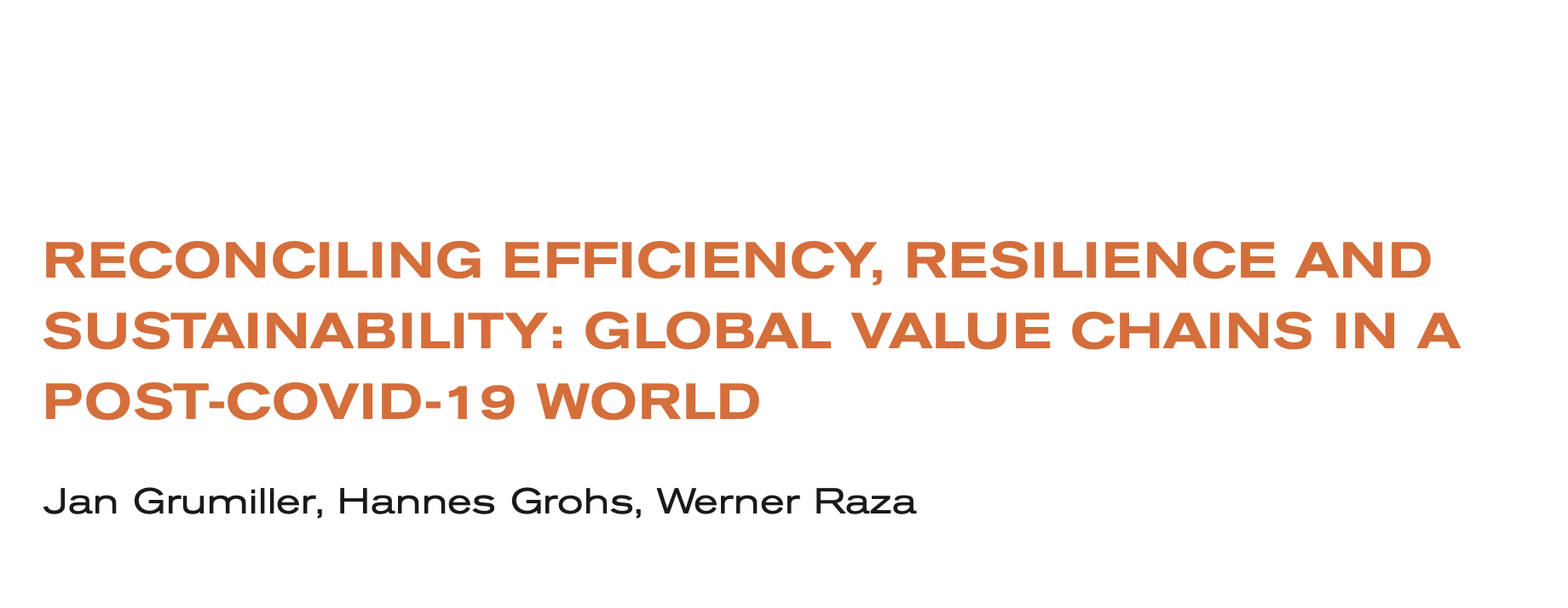
Mar 15, 2024
Stefano Ponte, Jennifer Blair, Mark Dallas
Power and inequality in global value chains: Advancing the research agenda
Power is a central, but largely undertheorized, concept for scholars of global value chains (GVCs). In this introduction to a special issue on power and inequality in GVCs, the authors summarize the key insights from the articles gathered here and explain how the collection advances our understanding of the types and forms of power operating in GVCs and their effect on different dimensions of ineq...
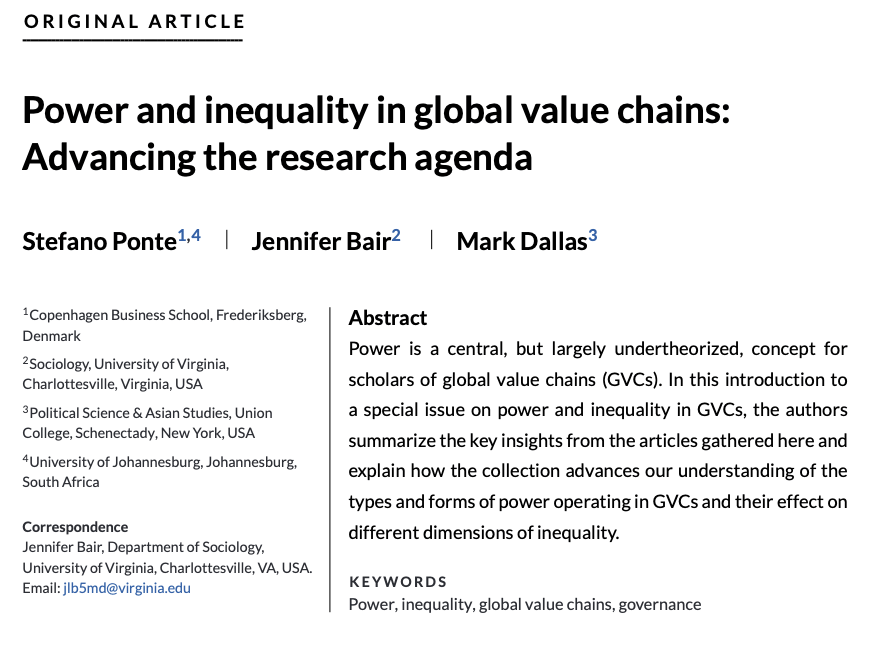
Mar 15, 2024
Johannes Van Biesebroeck, Emmanuel Buadi Mensah
The Extent of GVC Engagement in Sub-Saharan Africa
This paper exploits information from two different datasets to provide a novel and multi-dimensional picture of the engagement of all sub-Saharan African countries in global value chains (GVCs). It documents in detail the nature of the underlying data and the way it is used to construct several indicators of GVC engagement. As a companion to the paper, the data files are made available to interest...
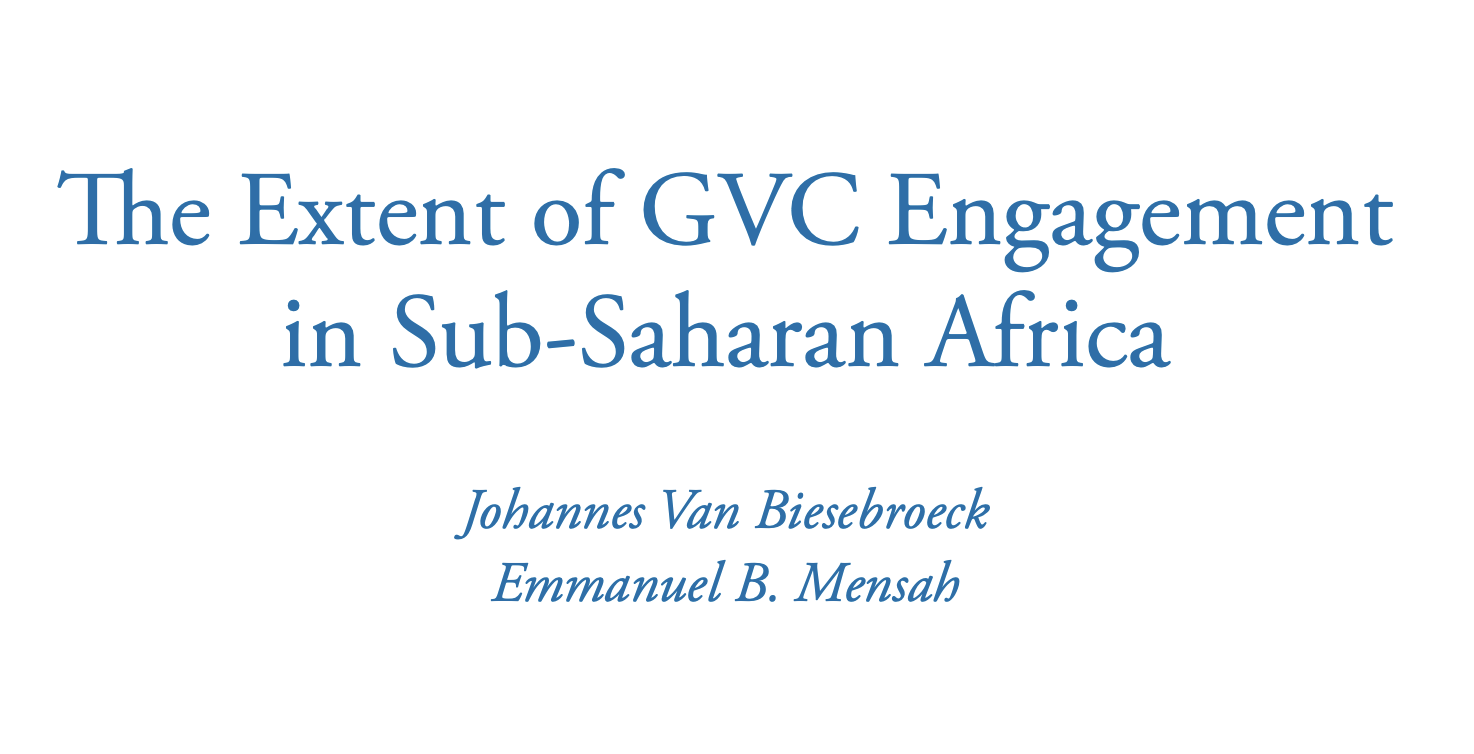
Mar 15, 2024
Rachael Diprose, Nanang Kurniawan, Kate Macdonald, Poppy Winanti
Regulating sustainable minerals in electronics supplychains: local power struggles and the ‘hidden costs’ of global tin supply chain governance
Voluntary supply chain regulation has proliferated in recent decades in response toconcerns about the social and environmental impacts of global production and trade.Yet the capacity of supply chain regulation to influence production practices on theground has been persistently questioned. Through empirical analysis of transnationalregulatory interventions in the Indonesian tin sector—centered o...
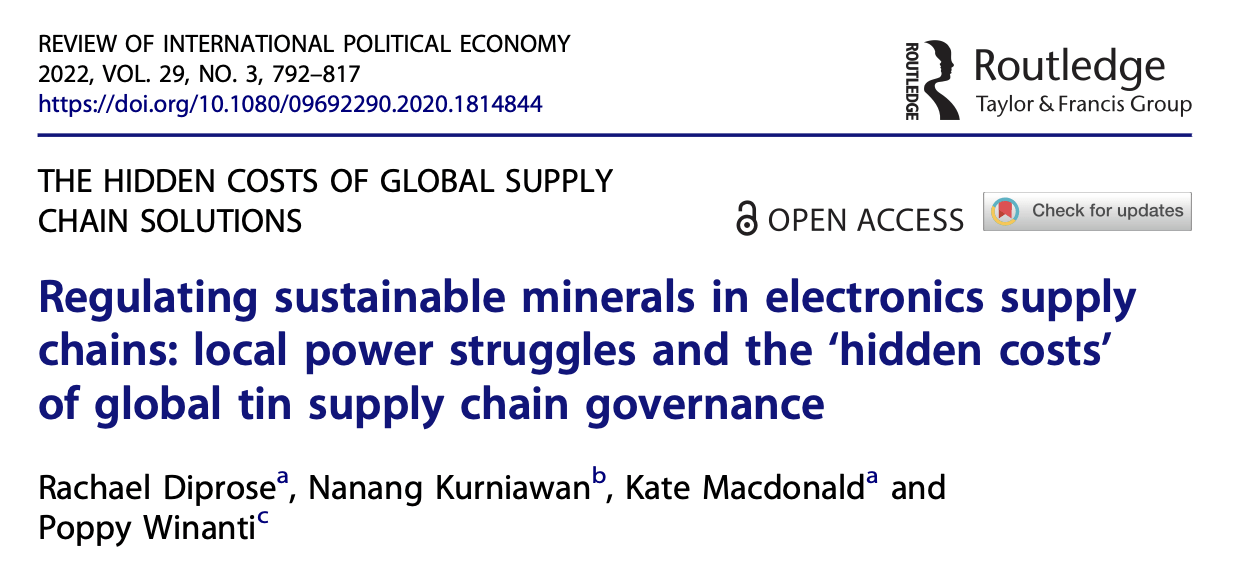
Mar 15, 2024
Rasmus Lema and Roberta Rebellotti
The Green and Digital Transition in Manufacturing Global Value Chains in Latecomer Countries
This paper is based on a review of the literature that brings together GVCs, green and digital transformations. Or to be more precise, the analysis is based on three main components: (a) the greening of GVCs and environmental upgrading; (b) the digital transformation of manufacturing GVCs and (c) an initial exploration of the green and digital joint transformations in GVCs. The aim is to provide a...
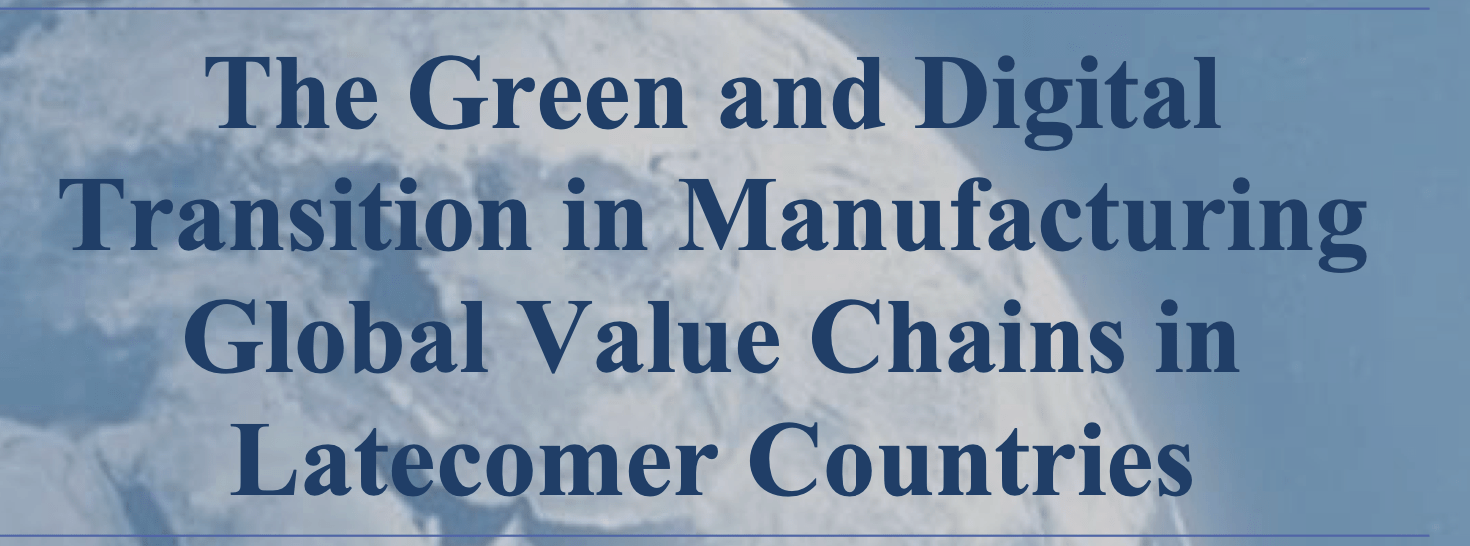
Mar 15, 2024
Elisabetta Gentile, Rasmus Lema, Roberta Rabellotti, Dalila Ribaudo
Greening Global Value Chains: A Conceptual Framework for Policy Action
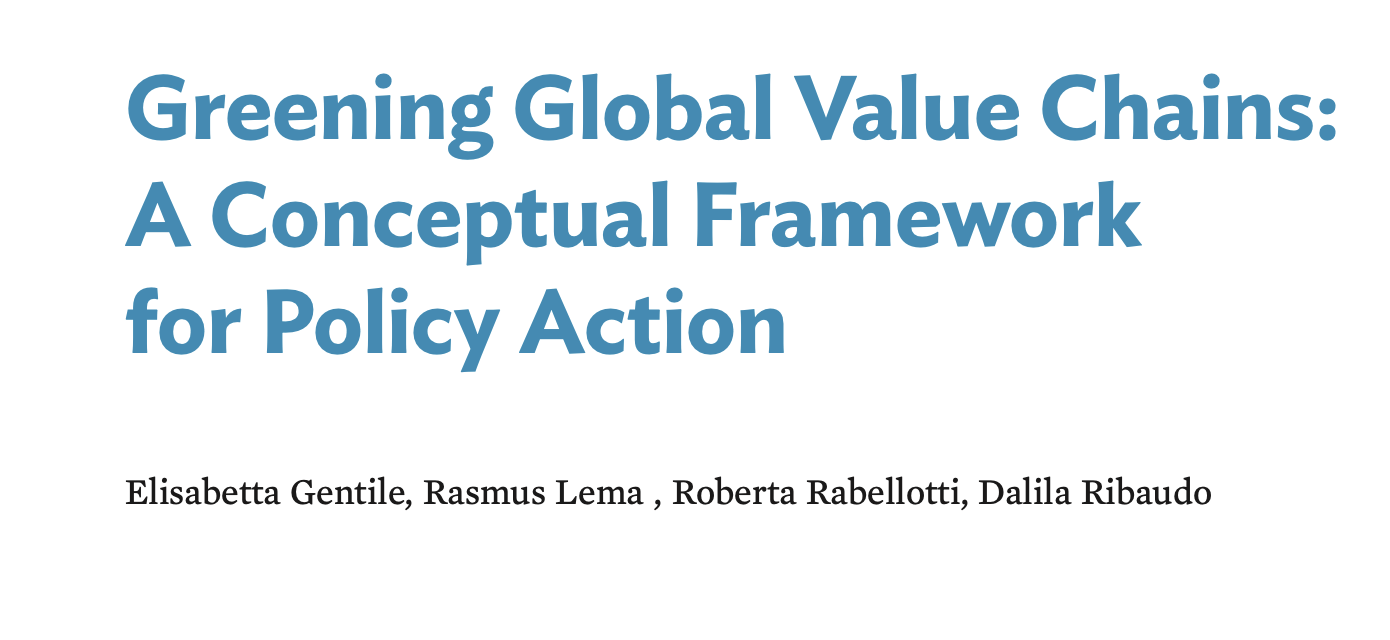
Mar 15, 2024
Rachel Alexander and Aarti Krishnan
Upgrading Trajectories in South Africa: Exploring the Roles of Customer and Supplier Link Types in Manufacturers’ Economic, Social and Environmental Upgrading
This study explores determinants of firms’ economic, social and environmental upgrading and downgrading trajectories in South Africa, with a focus on the manufacturing sector. Specifically, it considers connections between firms’ buyer and supplier relationships and their upgrading outcomes. Data is drawn from the World Bank Enterprise Surveys of 2007 and 2020 and analysed using social network...
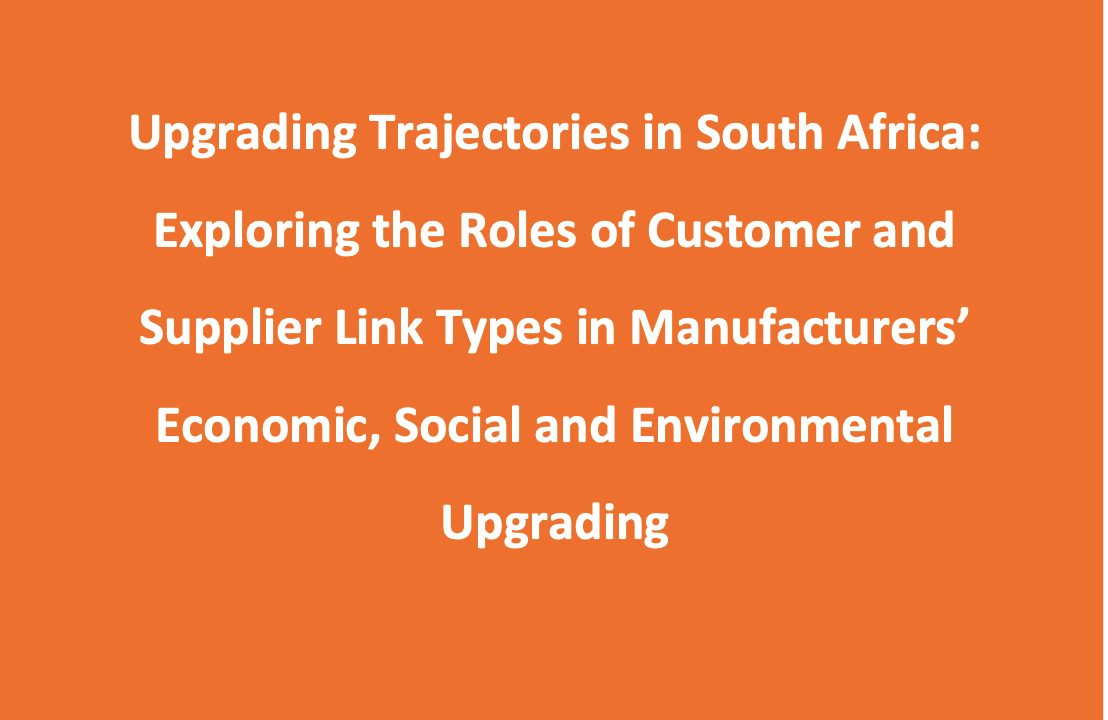
Mar 15, 2024
Pamina Koenig, Sebastian Krautheim, Claudius Löhnert, Thierry Verdier
Local global watchdogs: Trade, sourcing and the internationalization of social activism
International NGO campaigns criticizing firms for infringements along their internationalized value chains are a salient feature of economic globalization. We argue that understanding the international patterns of NGO campaigns requires accounting for the geography of their targets’ economic activities. We propose a model of global sourcing and international trade in which heterogeneous NGOs cam...
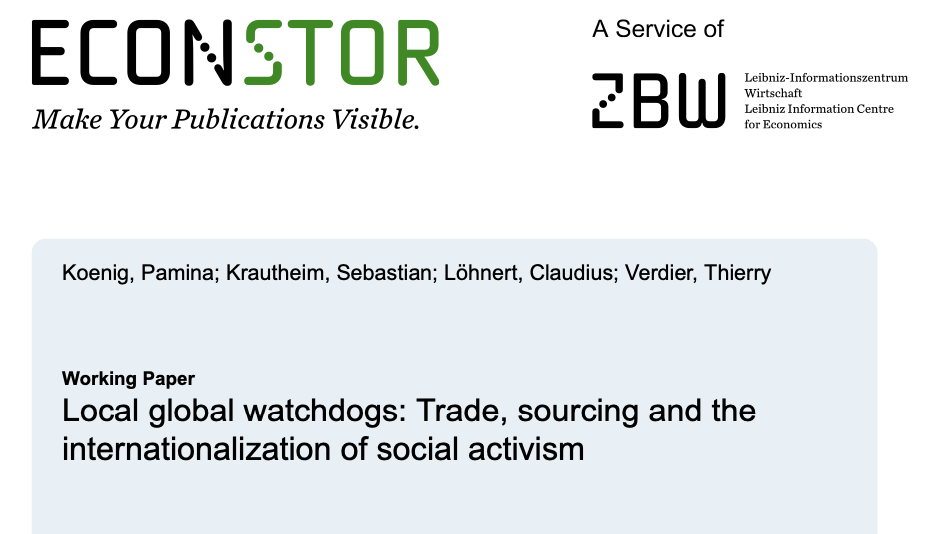
Mar 15, 2024
Pamina Koenig and Sandra Poncet
The effects of the Rana Plaza collapse on the sourcing choices of French importers
This paper analyzes the effects of a major reputational shock affecting textile importers from Bangladesh. The collapse of the Rana Plaza building in April 2013 generated a surge of activism and media coverage specifically targeting the firms that sourced from the factories affected by the disaster. Using monthly firm-level import data from French Customs, we study any potential disruption in thes...
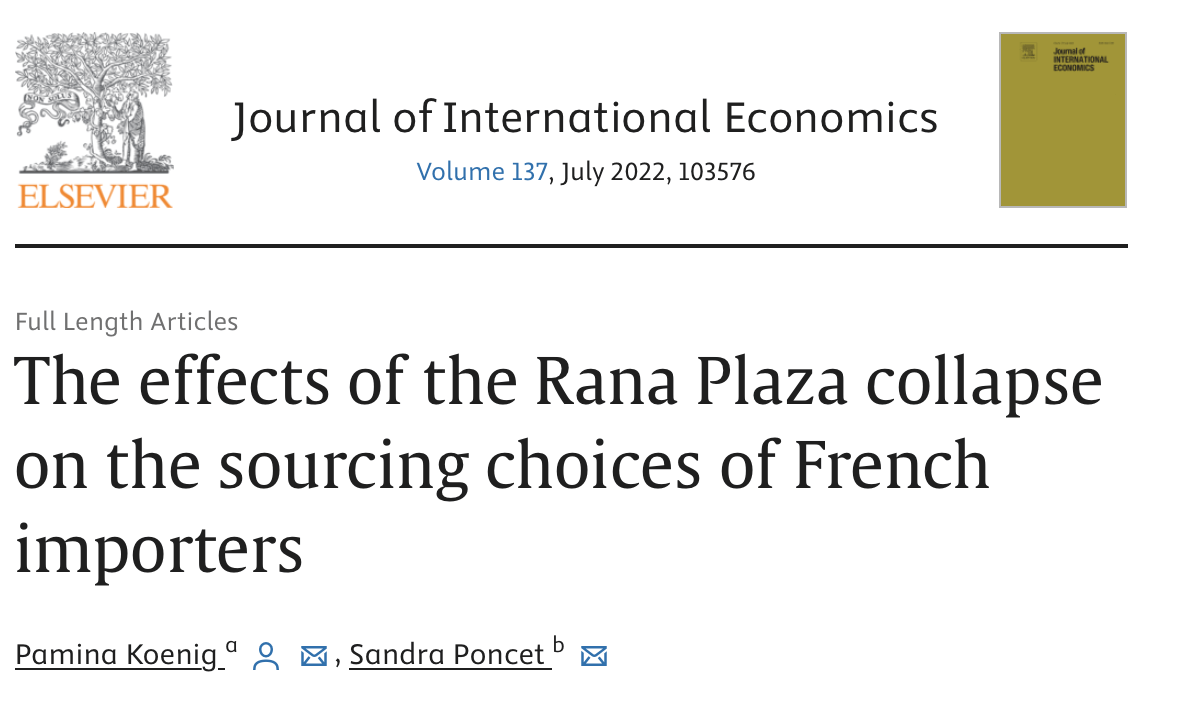
Mar 15, 2024
Raphael Kaplinsky and Erika Kraemer-Mbula
Innovation and uneven development: The challenge for low- and middle-income economies
This essay begins with a recounting of the rise of the Mass Production techno-economic paradigm and the emergence of the systemic economic crisis in the early 1970s. It then explains how this crisis was stemmed by the deepening of globalisation, which accelerated during the 1980s. However, shortly before the turn of the millennium, the internal fissures of the paradigm became more apparent, result...
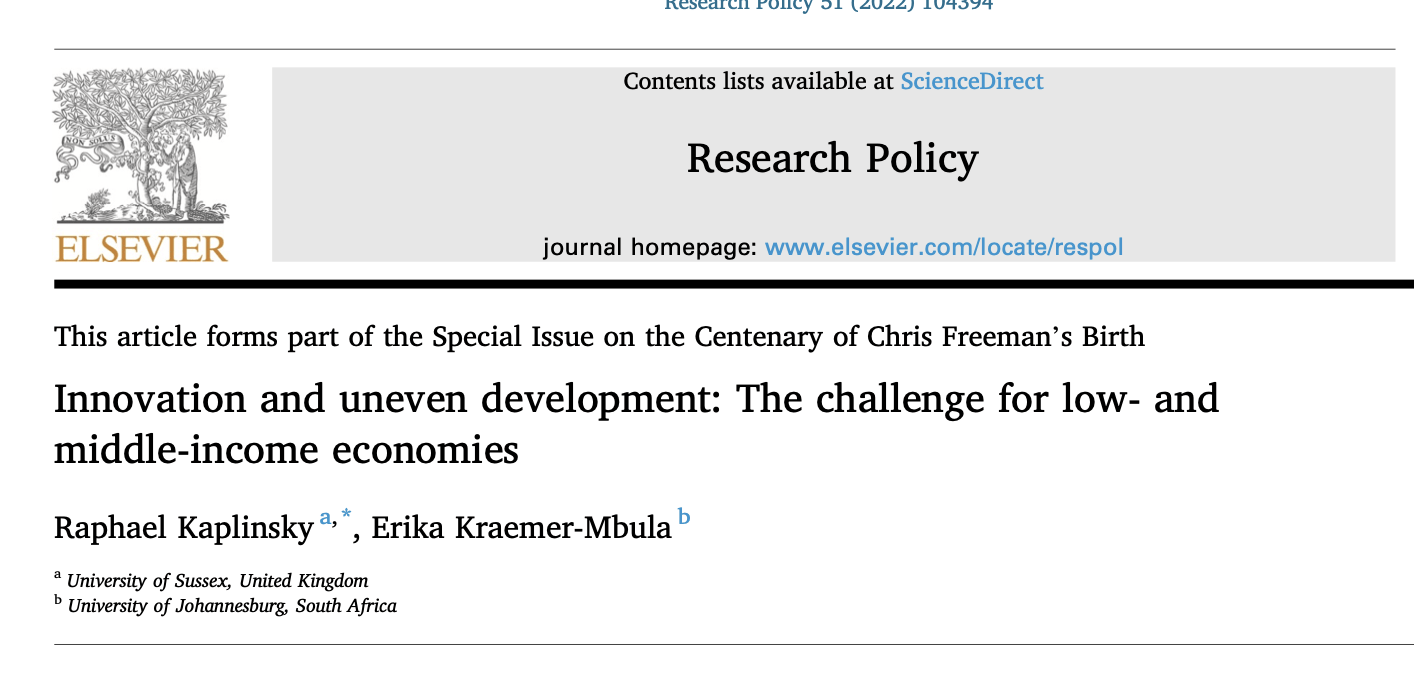
Mar 15, 2024
Jörg H. Grimm, Joerg Hofstetter, Joseph Sarkis
Corporate sustainability standards in multi-tier supply chains – an institutional entrepreneurship perspective
This study extends research on buyer firm roles in improving supplier sustainability practices by considering institutions – norms and rules – in the organisational field in which suppliers and sub-suppliers operate, exerting pressures on these actors to align their respectivepractices. We introducethe resource-based view to arrive at a framework outlining key capabilities for institutional en...

Mar 15, 2024
Maria-Therese Gustafsson, Jorge E. Rodriguez-Morales, Lisa M. Dellmuth
Private adaptation to climate risks: Evidence from the world’s largest mining companies
Private companies have in recent years started to disclose information about their exposure and responses to climate risks. However, we still know little about how and why private actors engage in climate change adaptation, and to what extent they do so in ways that improve societal resilience. This article addresses these questions. It conceptualizes private adaptation as consisting of institutio...
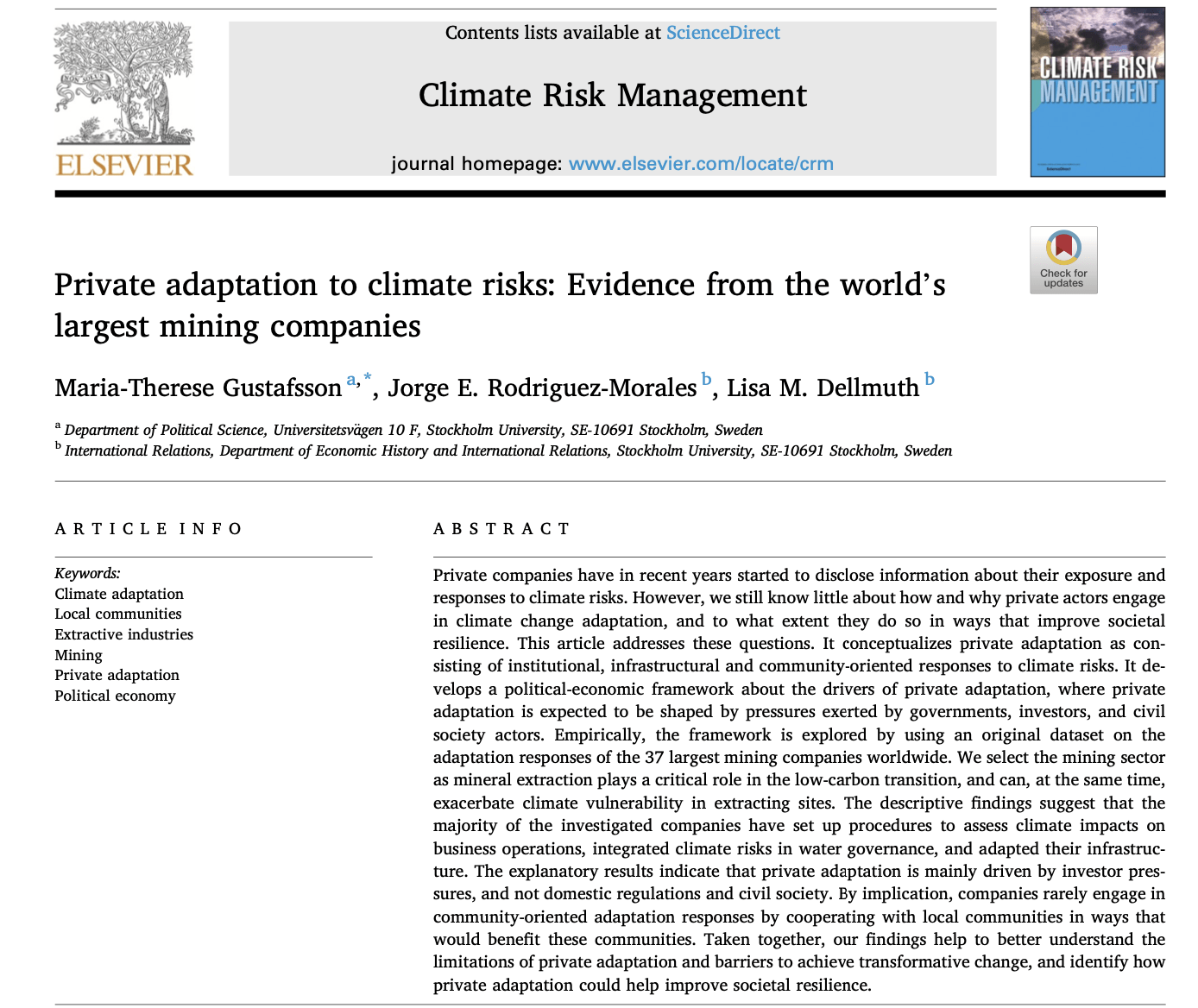
Mar 15, 2024
Janina Grabs and Rachael D. Garrett
Goal‑Based Private Sustainability Governance and Its Paradoxes in the Indonesian Palm Oil Sector
In response to stakeholder pressure, companies increasingly make ambitious forward-looking sustainability commitments. They then draw on corporate policies with varying degrees of alignment to disseminate and enforce corresponding behavioral rules among their suppliers and business partners. This goal-based turn in private sustainability governance has important implications for its likely environ...
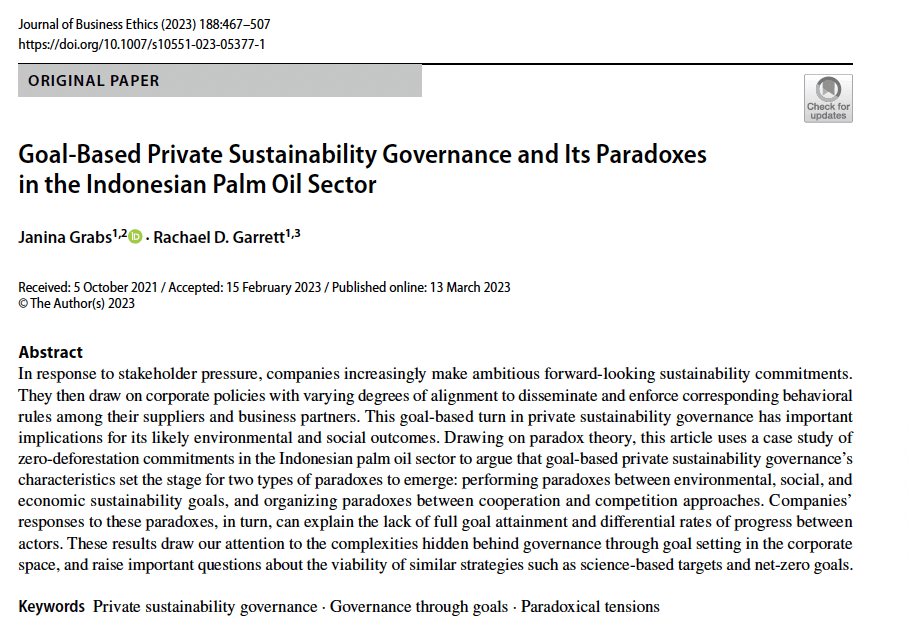
Mar 7, 2024
Haiou Mao, Holger Görg, Guopei Fang
Time to say goodbye? The impact of environmental regulation on foreign divestment
We look at divestments by foreign firms – a topic that has received comparatively little attention in the literature – and investigate how changes in the regulatory environment in the host country may impact on such divestment decisions. We use the implementation of China’s Two Control Zone (TCZ) policy as a “quasi-natural experiment”, using detailed firm level combined with city level d...
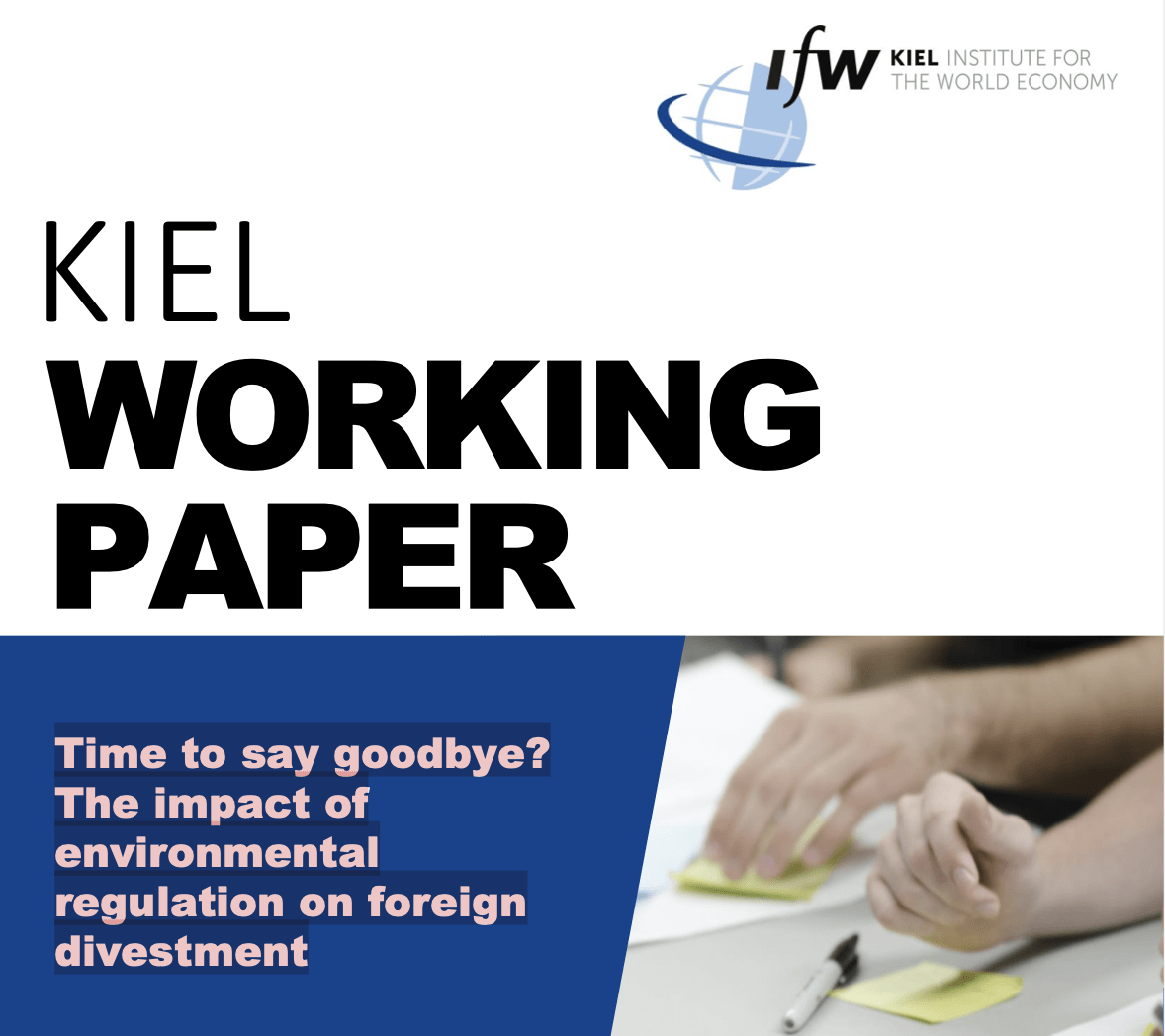
Mar 4, 2024
Johannes Jäger, Ewa Dziwok (Eds.)
Understanding Green Finance: A Critical Assessment and Alternative Perspectives
Exploring how green finance has become a key strategy for the financial industry in the wake of the 2007-08 financial crisis, this timely book critically assesses the current dominant forms of neoliberal green finance. Understanding Green Finance delivers a pioneering analysis of the topic, covering the essential tenets of green finance with an emphasis on critical approaches to mainstream views a...
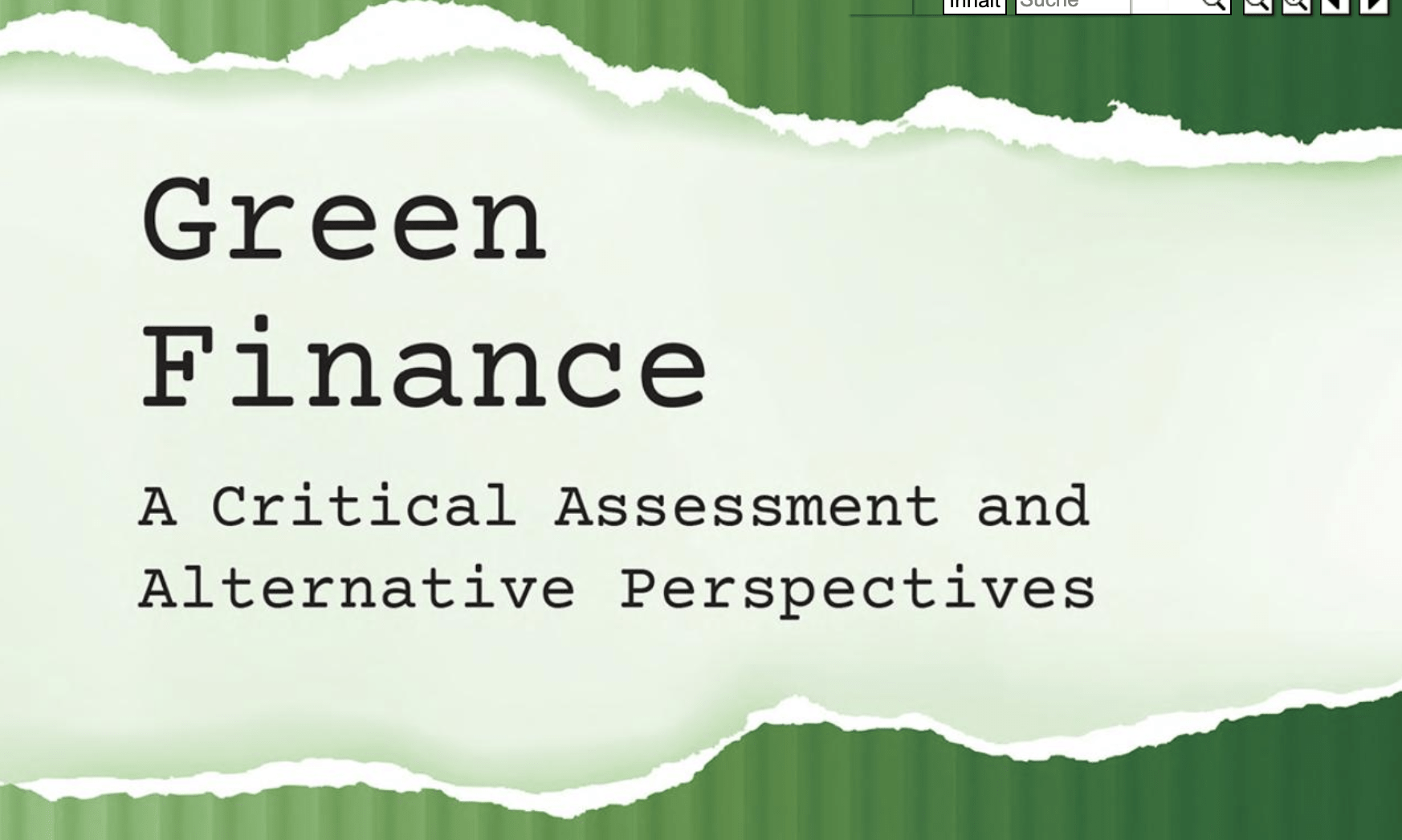
Mar 4, 2024
Johannes Jäger, Gonzalo Duran, Lukas Schmidt
Expected economic effects of the EU Corporate Sustainability Due Diligence Directive (CSDDD)
This study assesses the possible economic impacts of the EU Corporate Sustainability Due Diligence Directive (EU CSDDD). On the theoretical level, perspectives from neoclassical economics are combined with the value chain approach, and with the power resources perspective. Empirically, this study provides a brief overview of economic development, international trade, and human rights with a fo...

Mar 2, 2024
Christoph Scherrer
Embeddedness of Power Relations in Global Value Chains
This chapter provides an overview of the literature on power relations in global sourcing which goes beyond the prevalent focus on the dyadic business-to-business relation. The move through the various theories of power leads to my major claim which is that power dynamics in GVCs must be understood in the context of institutions in various fields and at different levels. While economic logic can e...
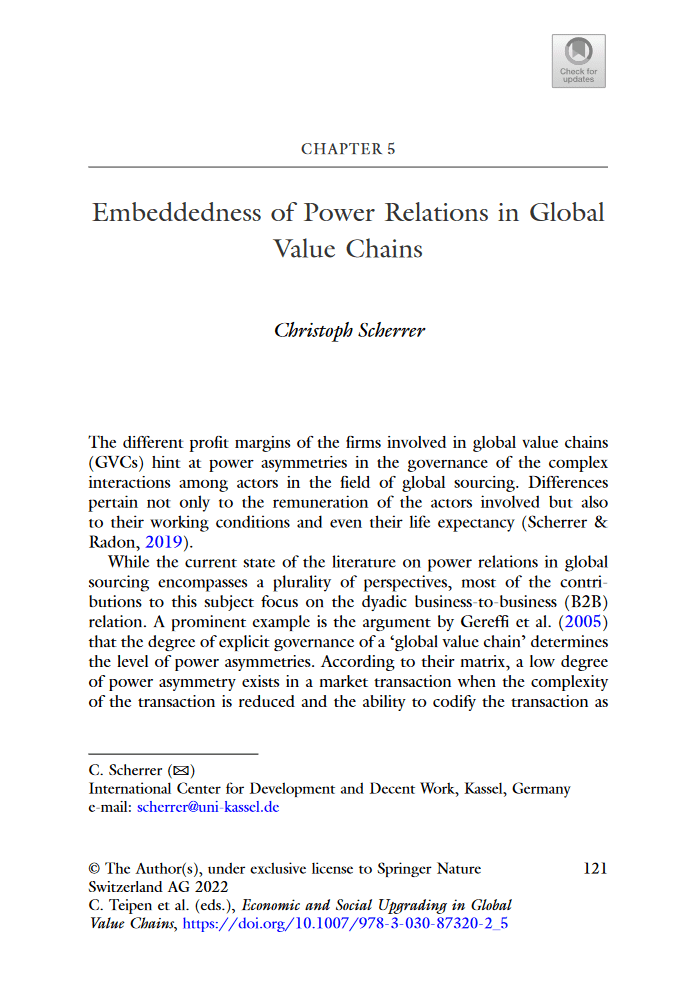
Mar 1, 2024
Karina Fernandez-Stark and Penny Bamber
Yet Another Disruptor in Global Value Chains is Imminent: The European Union Green Deal’s Circular Economy Regulations
As the world seeks to address the significant challenges faced by climate change, the EU has launched the European Green Deal (EGD), an ambitious new agenda to ensure the region’s climate neutrality by 2050. Deviating from past voluntary-based approaches, this bold new plan aims to legislate the sustainability of every aspect of every product on its market. Included in the EGD’s vast agenda is...

Jan 30, 2024
“Sustainable global supply chains in times of geopolitical crises” Annual Report 2023
The overarching topic of this year's report is "The Role of Geopolitics in Global Supply Chains", highlighting ways in which recent geopolitical and geo-economic developments are shaping and influencing current debates and policy processes around global supply chains (GSCs). Following forewords from the network hosts and Dr. Bärbel Kofler (German Ministry for Economic Cooperation a...
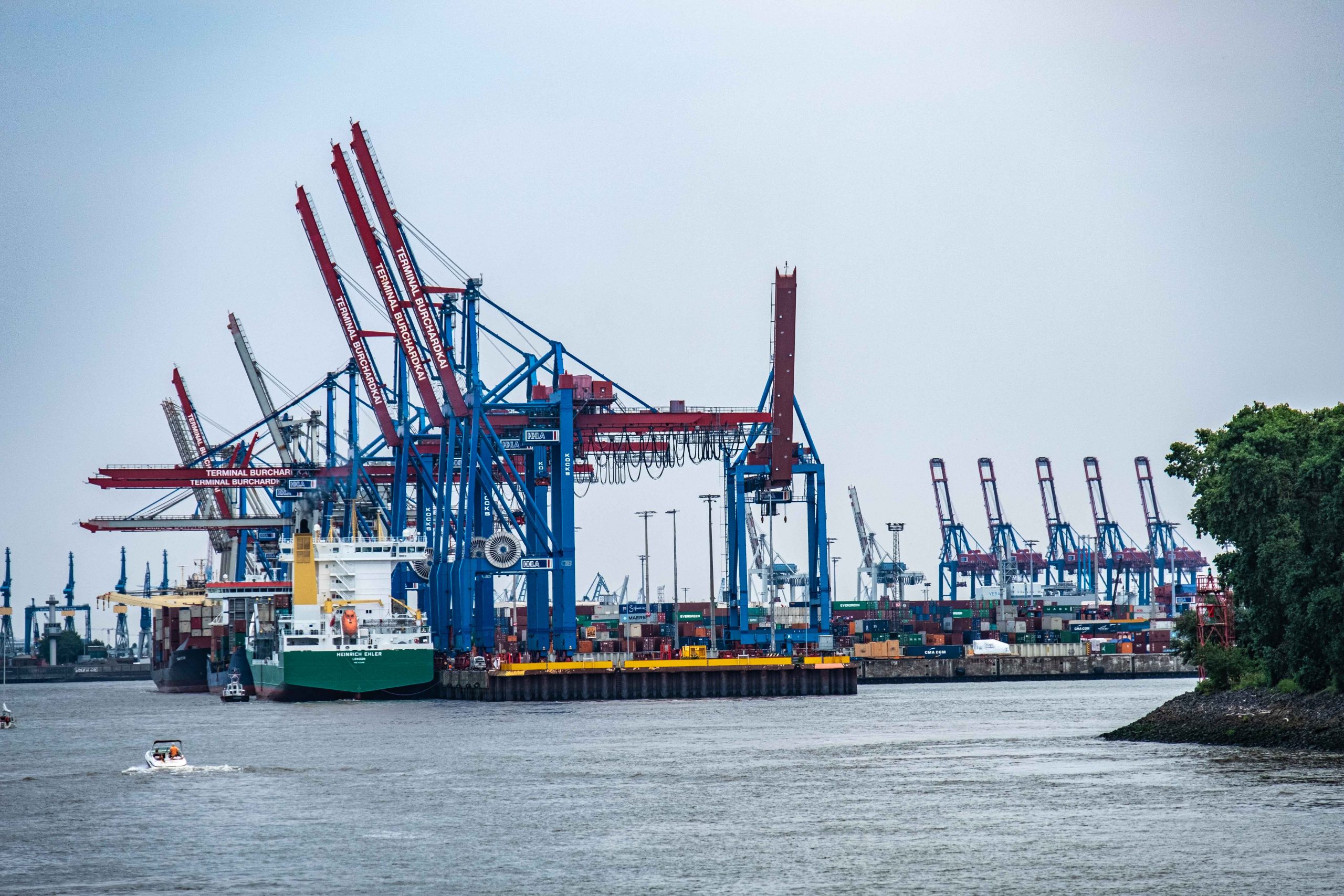
Jan 19, 2024
Mike Morris
Chinese Firms and Adherence to Global Environmental, Social and Governance (ESG) Standards in Developing Countries: Is there Potential to Create Common Ground?
This paper focuses on analysing how Chinese firms operate in Latin America, Asia and Africa in regard to ESG (environmental, social and governance) standards and sustainability issues. How do they respond to the increasing global value chain requirement to incorporate and maintain ESG standards? Is their space for an alignment between Western development cooperation ESG policies, frameworks, strat...

Aug 31, 2023
Philip Schleifer and Luc Fransen
Towards a Smart Mix 2.0? Understanding Political Dynamics of Heterogeneity and Integration in Sustainable Supply Chain Governance
The adoption of new due diligence regulations in the European Union (EU) and other advanced economies has further increased the heterogeneity of global supply chain governance. In a recent study (Schleifer and Fransen 2022), we evaluate calls for a “smart mix 2.0” that combines public regulations with private governance instruments and new partnerships with producer countries. Private sustaina...

Jun 12, 2023
Inga Carry, Melanie Müller, Nadine Godehardt
The Future of European-Chinese Raw Material Supply Chains
When it comes to being supplied with raw materials, Europe faces a number of challenges. These include the diversification of European supply chains, the implementation of effective sustainability standards, and the reduction of strategic dependencies on China. What will European-Chinese raw material supply chains look like in 2030? This paper outlines three possible scenarios, illustrating the ...
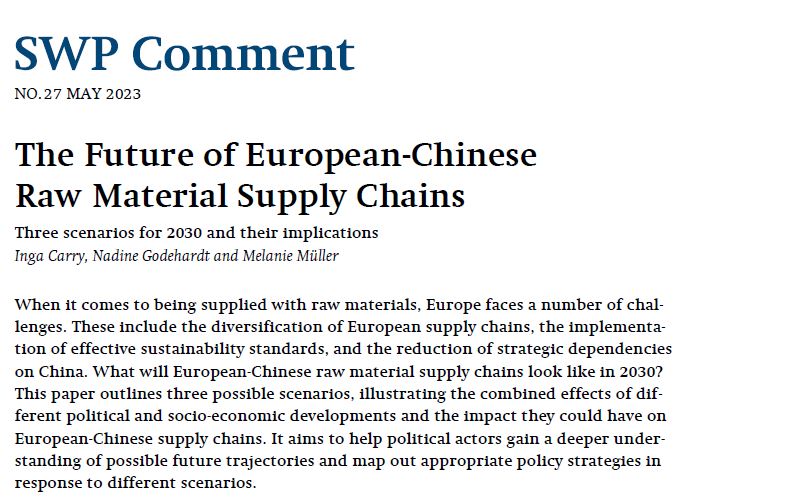
May 26, 2023
Almut Schilling-Vacaflor & Maria-Therese Gustafsson
Towards more sustainable global supply chains? Company compliance with new human rights and environmental due diligence laws
Binding regulations have, recently, emerged in the Global North with the aim of holding companies accountable for environmental and/or human rights impacts throughout their supply chains. This article develops and applies an analytical framework to analyze corporate accountability dynamics in global trade, with a focus on the French Duty of Vigilance (DV) law. We analyze how companies in the agri-...
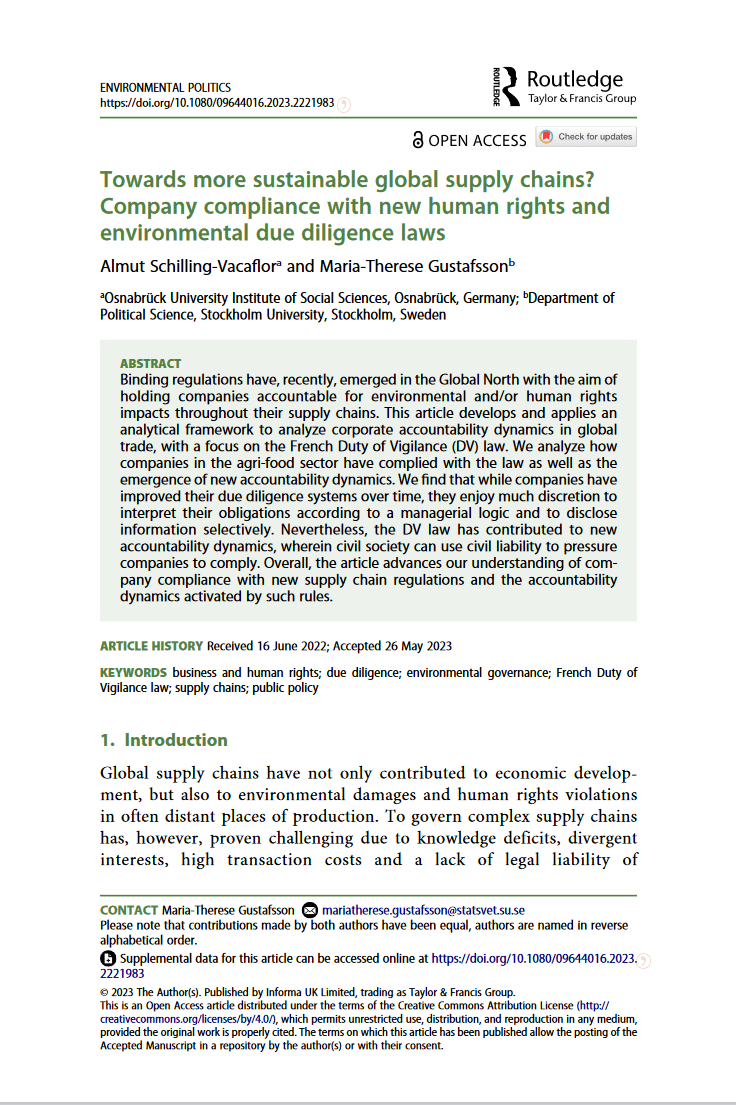
Apr 21, 2023
What is the effect of environmental standards on agricultural value chains?
Mangos or rice, chocolate or even wood - just to mention a few agricultural products that are heavily exported from several countries in the Global South to the Global North. A growing number of them are grown, harvested and processed in line with environmental standards and labels. These standards are meant to improve environmental conditions. And consumers might think a environment friendly labe...

Jan 1, 2023
Melanie Müller, Christina Saulich, Meike Schulze, Svenja Schöneich
From Competition to a Sustainable Raw Materials Diplomacy
German and European businesses are highly dependent on metals. Demand for these raw materials is expected to grow even further as they will be needed for the green energy and electric mobility transition, digitalisation and other emerging technologies. Geopolitical developments influence security of supply. China’s central role in mineral supply chains is a major factor of uncertainty in th...

Nov 22, 2022
Franziska Ollendorf, Goodlet Ansah
Local Cocoa Marketing under Pressure: Sustainability certification and new forms of competition in Ghana’s cocoa industry
In the context of persisting sustainability challenges in the Global Cocoa-Chocolate Chain (GCCC), sustainability certification gained momentum as a major industry response. While much research has been undertaken regarding the effects of certification schemes on farming practices and farmers’ livelihoods, there is little understanding of how these private sector responses transform the local ec...

Nov 19, 2022
Ari Van Assche, Rajneesh Narula
Internalization strikes back? Global value chains, and the rising costs of efective cascading compliance
Strategies that make quasi-internalization feasible such as cascading compliance provide a means for lead firms to control the social and environmental conditions among their suppliers and sub-suppliers in ways other than through equity ownership. We take an internalization theory lens to reflect on the effectiveness of cascading compliance as a governance mechanism to promote sustainability along...
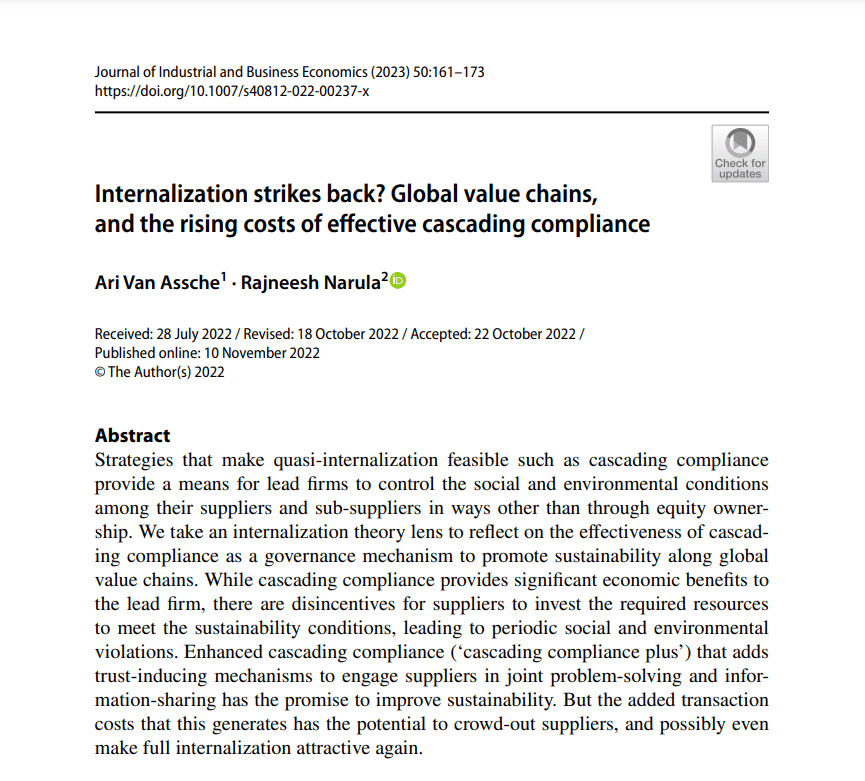
Sep 24, 2022
Jan Grumiller, Hannes Grohs, Werner Raza
How to align efficiency, resilience and sustainability in GVCs? A conceptual assessment
The COVID-19 pandemic-induced lockdowns and export restrictions highlighted the vulnerability of global trade and global value chains (GVCs). What is more, many commentators argue that the likelihood of exogenous shocks that threaten international trade and GVCs will increase in the future. This includes natural disasters, pandemics, or political conflicts. The Russian war in Ukraine is the most r...
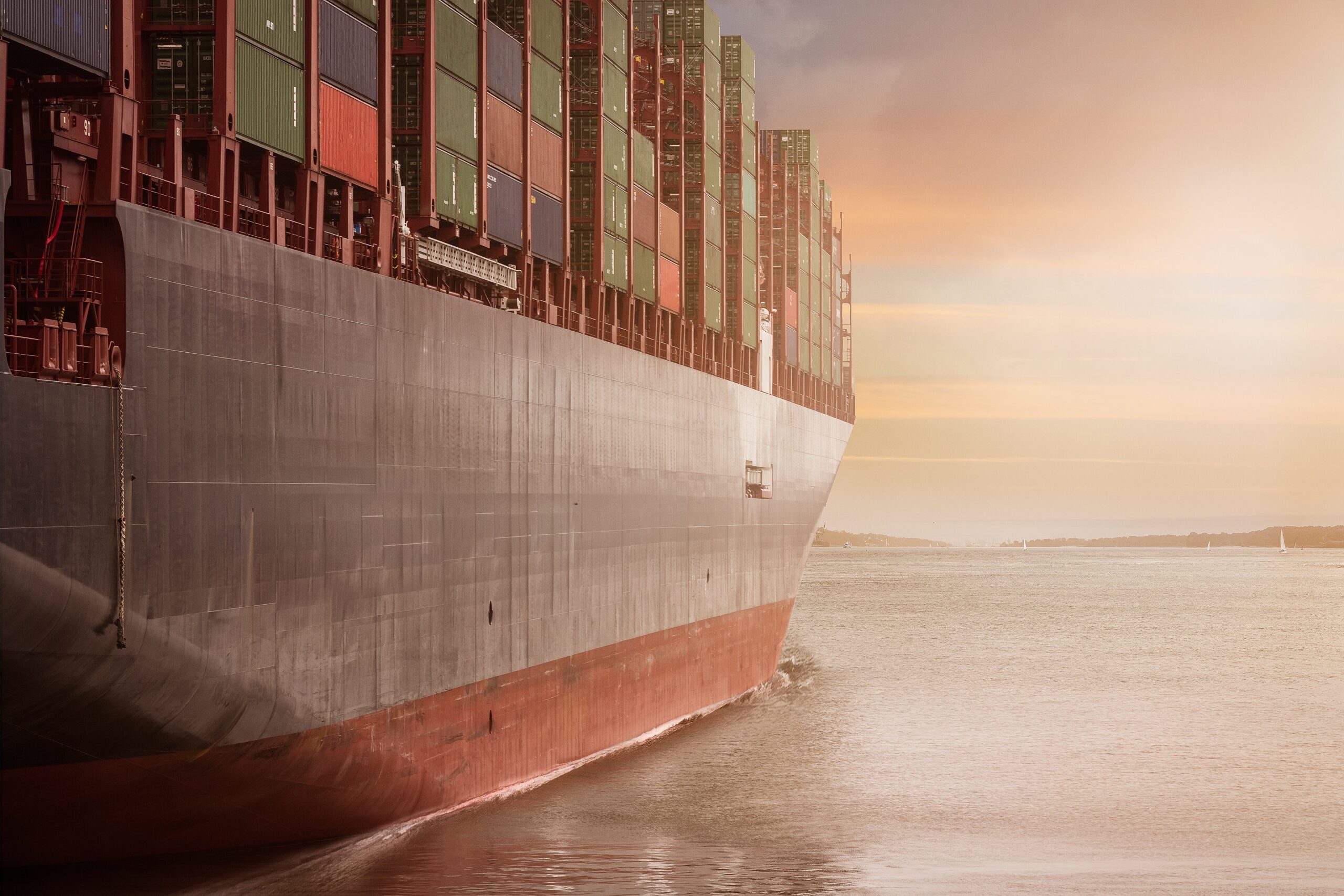
Sep 15, 2022
Philip Schleifer and Luc Fransen
Towards a Smart Mix 2.0 – Harnessing Regulatory Heterogeneity for Sustainable Global Supply Chains
Over the past three decades, efforts to address human rights and environmental risks in global supply chains have spurred a plethora of industry self-regulation, third-party certification schemes, voluntary due diligence guidelines, and mandatory supply chain regulations. The resulting heterogeneity of initiatives, instruments, and standards has been subject to much debate, with academics and poli...
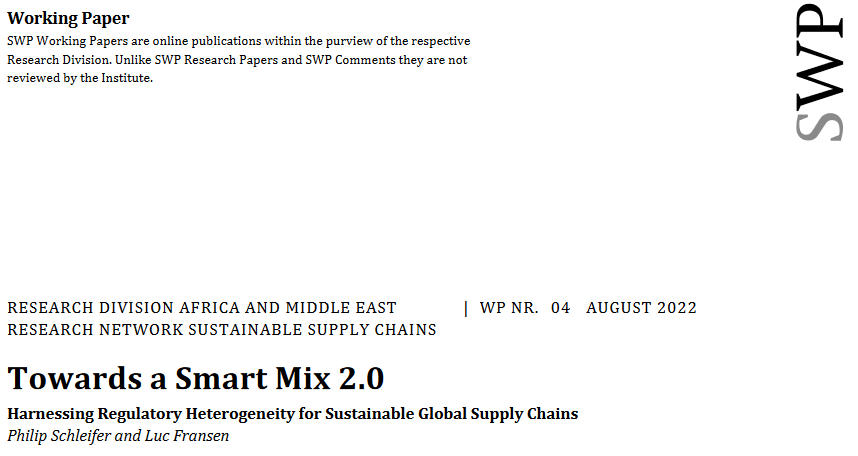
Sep 15, 2022
Philip Schleifer
Varieties of multi-stakeholder governance: selecting legitimation strategies in transnational sustainability politics
Multi-stakeholder initiatives (MSIs) are often referred to as the ‘gold standard’ of private governance. However, existing MSIs vary strongly in their institutional designs and the ways in which they use inclusiveness, procedural fairness and, expert-based strategies to create legitimacy for their rules. This article investigates these institutional choices. It reviews arguments about demand f...
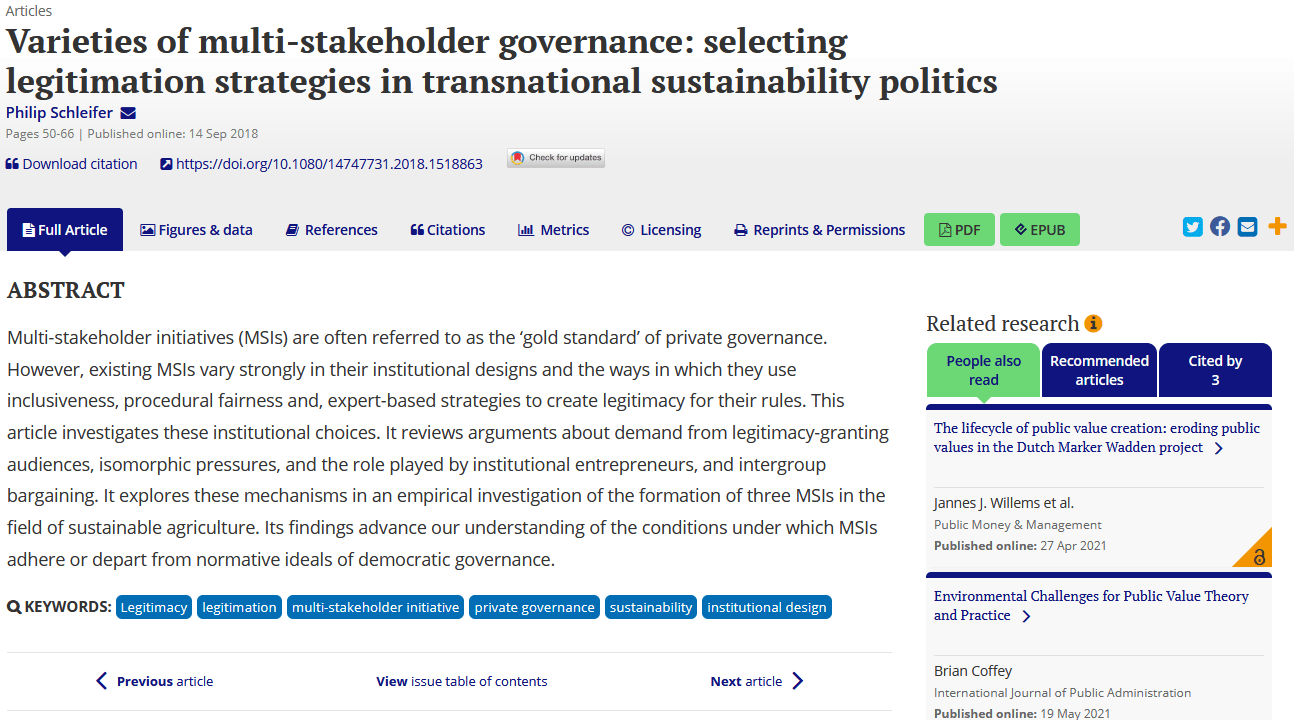
Sep 15, 2022
Philip Schleifer, Yixian Sun
Reviewing the impact of sustainability certification on food security in developing countries
What is the impact of sustainability certification on food security in developing countries? This article explores the issue through a systematic review of the extant scholarship, complemented by a selective review of key studies examining the wider socio-economic effects of certification that may affect food security indirectly. To guide the analysis, we identify three main causal mechanisms – ...
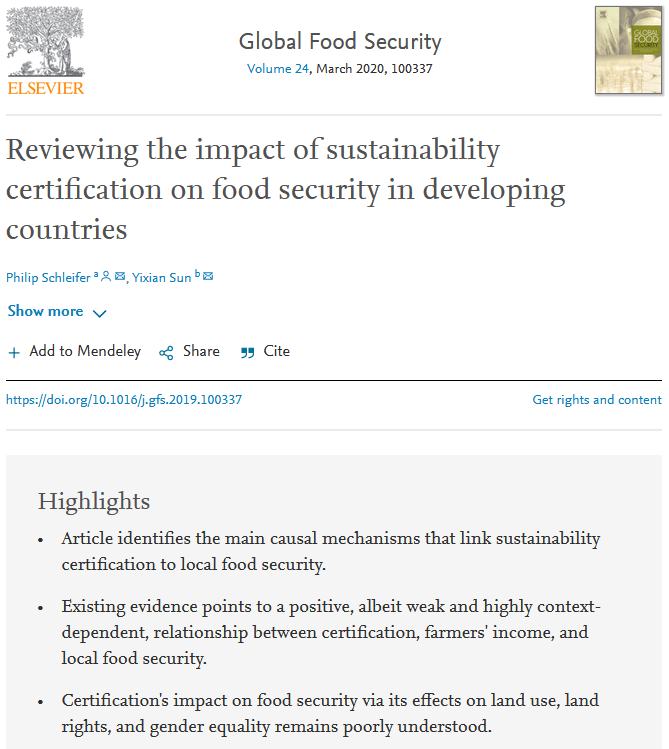
Sep 15, 2022
Philip Schleifer, Clara Brandi, Rupal Verma, Katharina Bissinger, Matteo Fiorini
Voluntary standards and the SDGs: Mapping public-private complementarities for sustainable development
To strengthen global sustainability governance, academics and policymakers have called for a better integration of private governance with public policy instruments. Surprisingly, however, systematic research on the state of such public-private complementarities in the field of sustainable development is lacking. With a focus on voluntary sustainability standards and the United Nations 2030 Agenda...
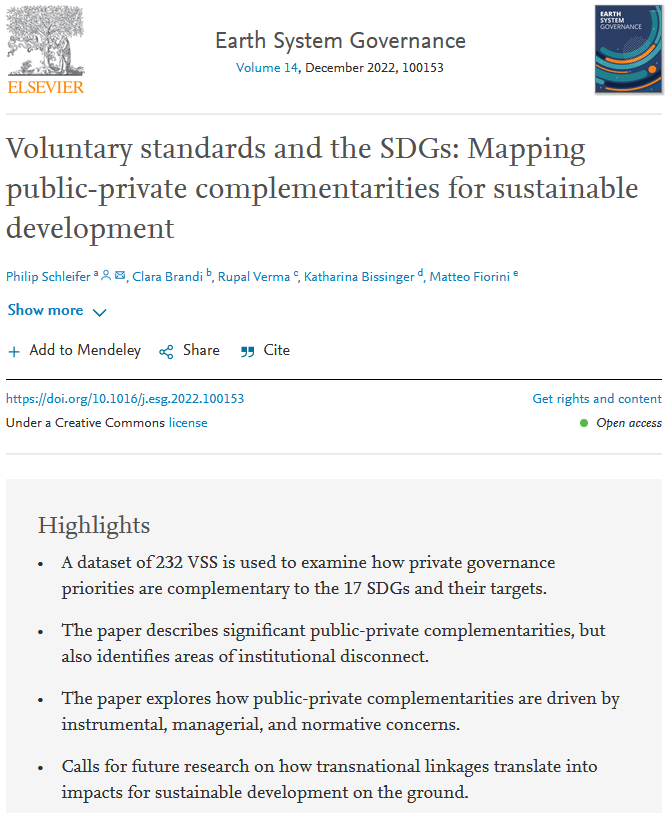
Aug 23, 2022
Laura M.G. Hidalgo, Rosane N. de Faria, Roberta Souza Piao, Christine Wieck
Multiplicity of sustainability standards and potential trade costs in the palm oil industry
The growing impact of the global production of agricultural commodities has created new regulations that aim at a more sustainable trade. Sustainability standards (SS) are essential tools for transnational trade governance because they increase the possibility of recognizing products from sustainable sources. However, there is currently a proliferation of SS in almost every industry. This paper pr...
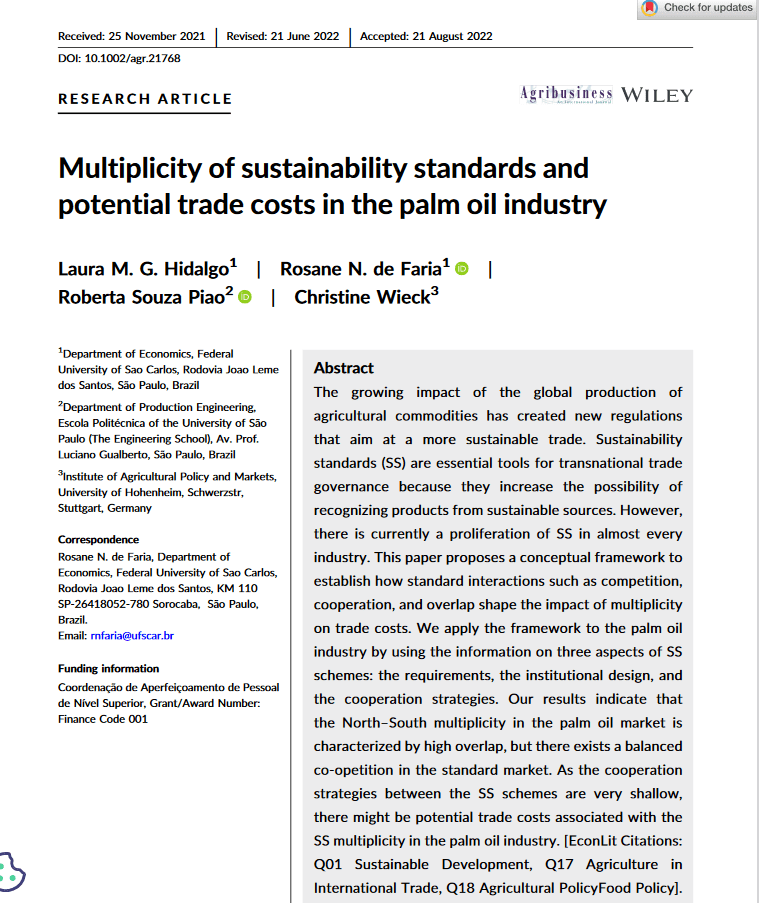
Jun 28, 2022
Bettina Rudloff
Sustainable international value chains: The EU’s new due diligence approach as part of a policy mix
A new family of regulatory approaches affecting international value chains has been initiated recently, mainly by developed countries, the Due Diligence Laws (DDLs). These new approaches are an addition to already existing (and partially) older trade measures that have already been adapted in the past to better incorporate sustainability goals. However, adding the DDLs on top of already existing o...
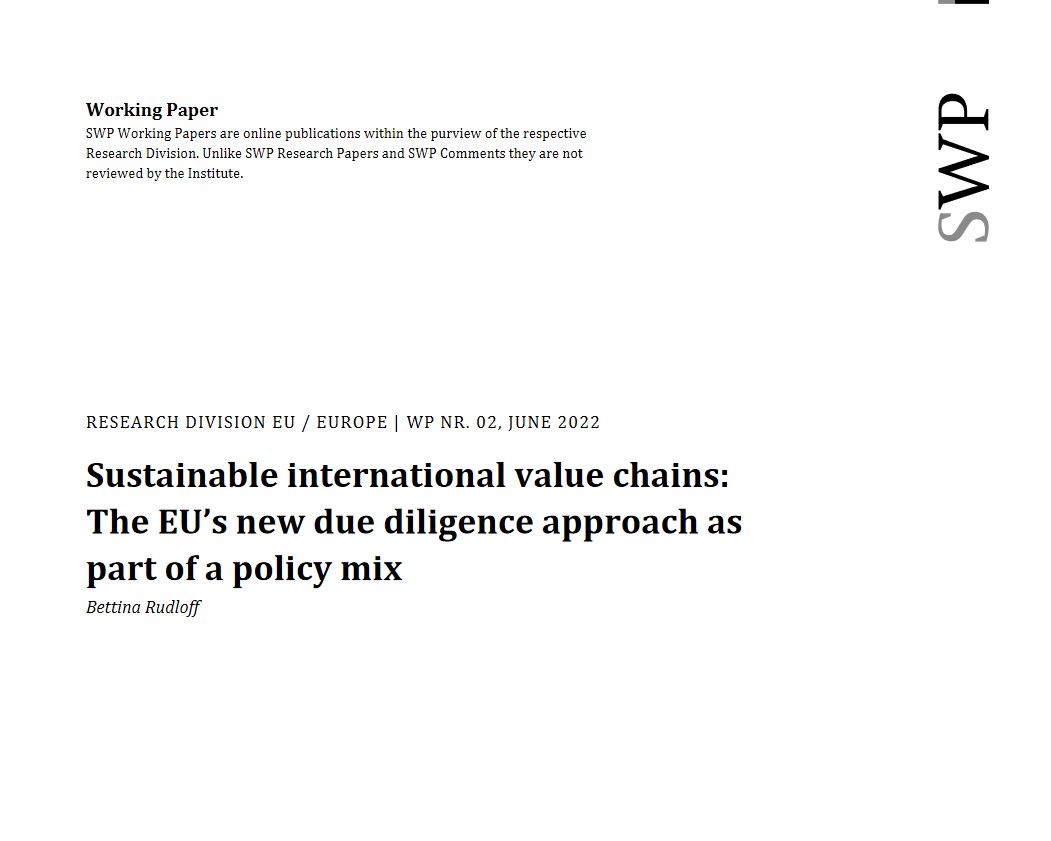
Apr 25, 2022
Rachael Diprose, Nanang Kurniawan, Kate MacDonald and Poppy Winanti
Promoting sustainable minerals through global supply chains: scaling up or crowding out sustainability?
Supply chain regulation seeking to promote sustainable production processes in natural commodity sectors has proliferated in recent decades in response to concerns about the social and environmental impacts of global commodity extraction. Alongside traditional forms of regulation involving government law and policy, a range of non-governmental regulatory systems have emerged, often combining volun...

Apr 5, 2022
Sustainable Global Supply Chains Report 2022
Global supply chains affect the economy, the environment and social welfare in many ways. Worldwide, economies are experiencing global supply shortages today, affecting key industries such as automotive and consumer electronics as well as vaccine and medical supplies industries. These preoccupy policymakers, who are debating independent national production capacities and restrictions on internatio...

Mar 25, 2022
Janina Grabs, Federico Cammelli, Sam Levy, and Rachael Garrett
How to find synergies between effectiveness and equity when designing supply chain sustainability policies
Companies with global supply chains are under growing pressure to ensure that their activities and sourcing patterns abroad do not contribute to environmental degradation and human rights abuses. In response, many businesses create supply chain sustainability policies. Such company-internal schemes, such as supplier codes of conduct or internal guidelines, specify companies’ commitments and expe...
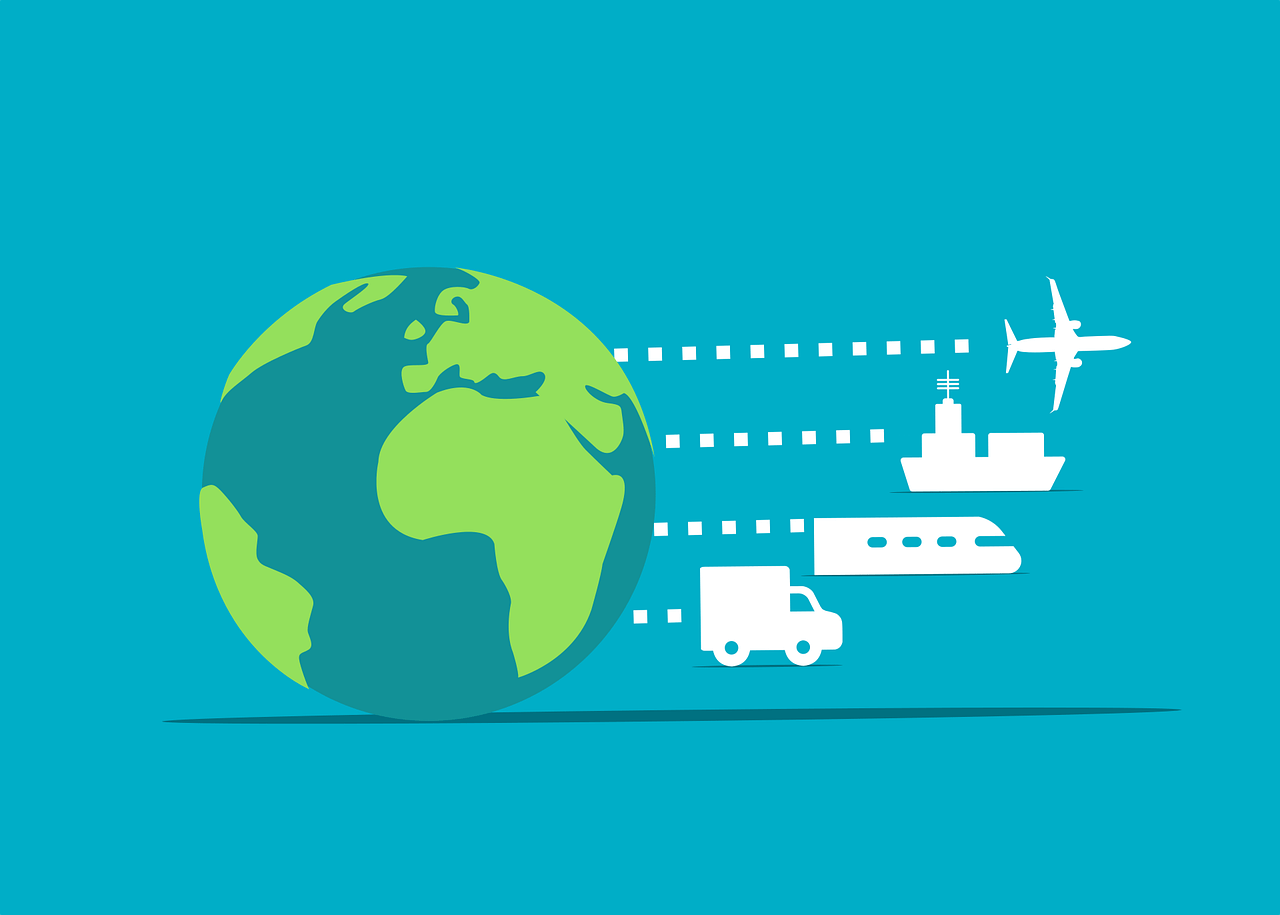
Mar 23, 2022
Burcu Gözet, Henning Wilts
The circular economy as a new narrative for the textile industry: an analysis of the textile value chain with a focus on Germany’s transformation to a circular economy
At the end of March 2022, the European Commission published its new EU Strategy for Sustainable and Circular Textiles. Its ambitious vision is to reduce textile waste, promote circular measures and minimise the negative environmental impacts of the textile industry. But what would a textile industry that keeps textiles in a closed loop look like, and what political conditions would be required in ...
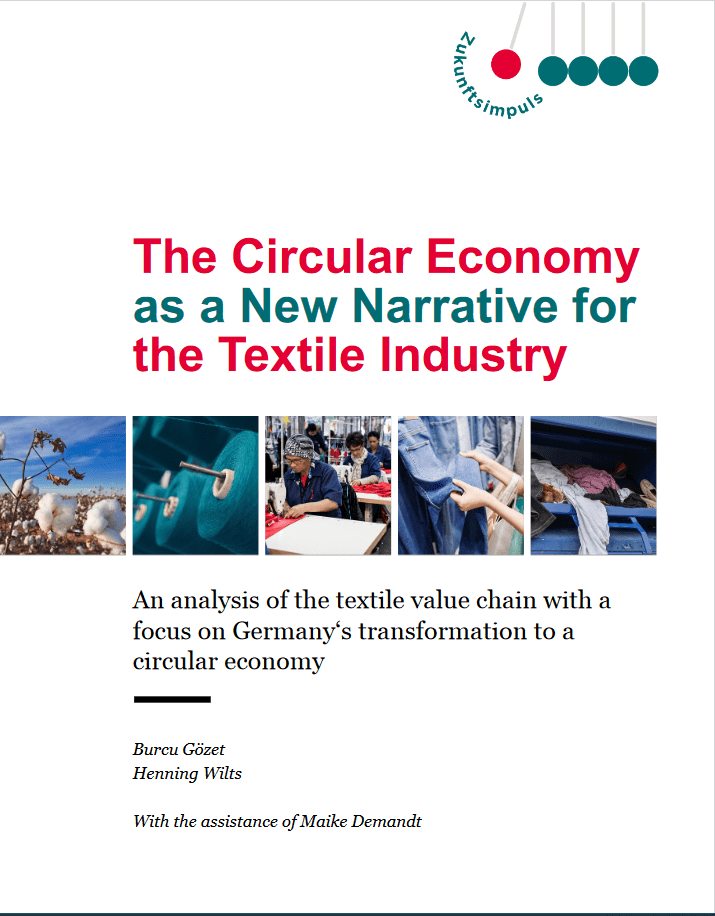
Feb 18, 2022
Larissa Rodrigues
Brazil exports illegal gold: How to tackle the problem
Illegal gold mining in Brazil is an old problem. With gold prices skyrocketing in recent months because of investors’ reactions to the Covid-19 pandemic, the issue has only become worse (Tollefson, 2021). A new gold rush has started in the Amazon rainforest, but not without leaving behind a trace of destruction and invasions of Indigenous Lands and Conservation Units. The result: Brazil expor...
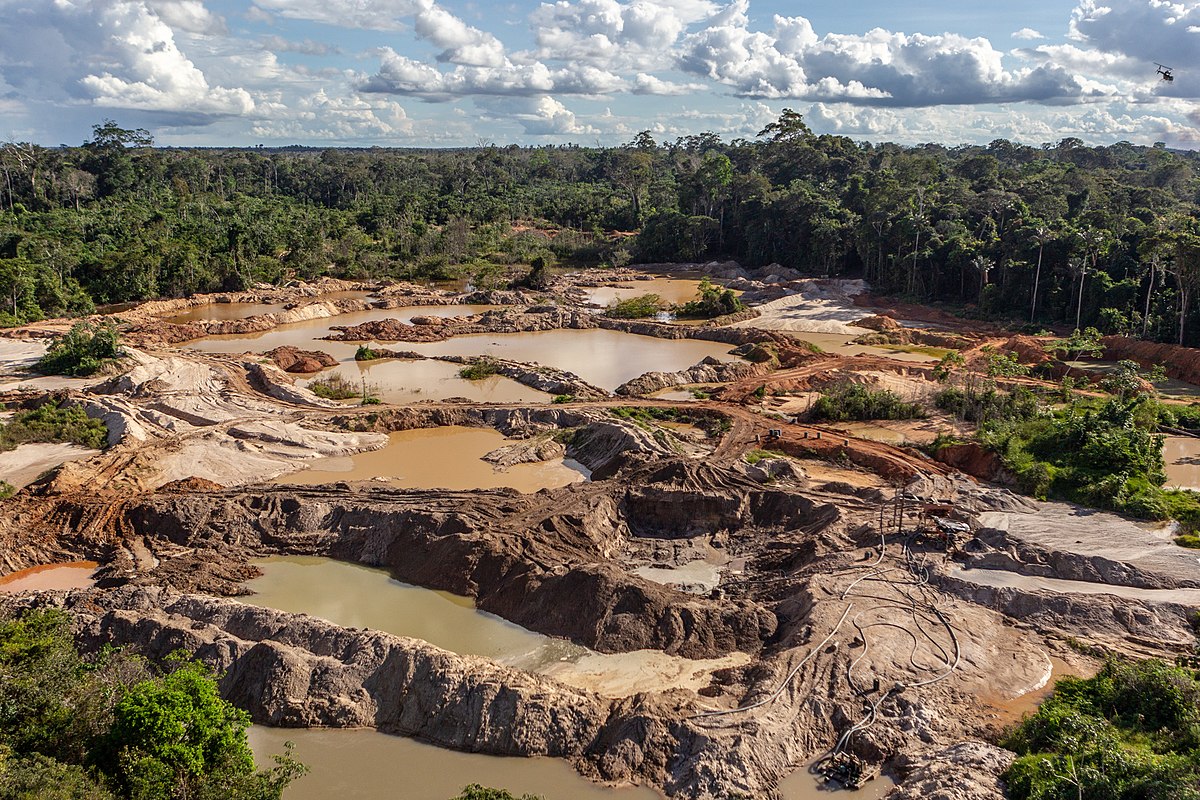
Jan 1, 2022
Hannes Grohs, Jan Grumiller, Werner Raza
Resilience in Sustainable Global Supply Chains: Evidence and Policy Recommendations
The COVID-19 pandemic-induced lockdowns and export restrictions highlighted the vulnerability of global trade and global value chains (GVCs). What is more, many commentators argue that the likelihood of exogenous shocks that threaten international trade and GVCs, such as natural disasters, pandemics, or political conflicts will increase in the future. In light of the new global context and due to ...
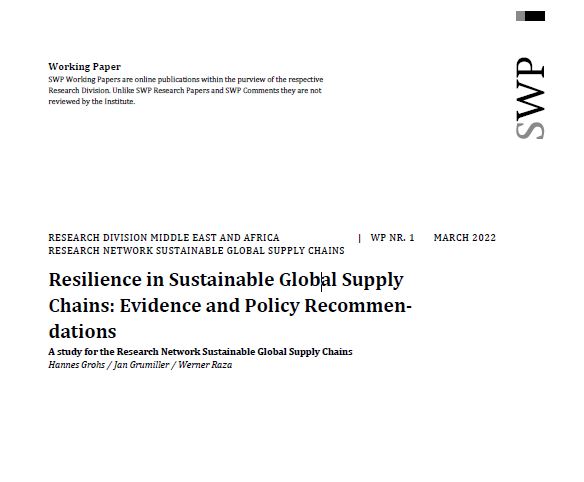
Jan 1, 2022
Inga Carry, Günther Maihold
Illegal logging, timber laundering and the global illegal timber trade
Deforestation claims an estimated 10 million hectares each year (FAO 2020). Today’s global demand for timber products1 simply cannot be met by legal, sustainable forestry anymore. The competition for cheap wood products on the global timber market has become a major driver of illegal deforestation and the global illegal timber trade. This article focuses on activit...
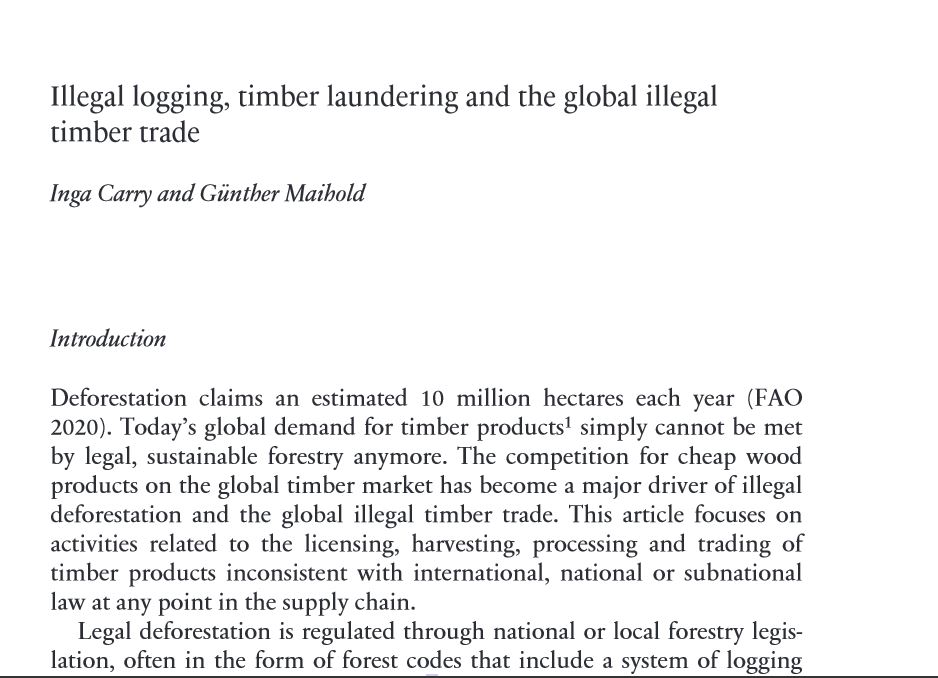
Jan 1, 2022
Günther Maihold, Fabian Mühlhöfer
Supply Chain Instability Threatens Security of Supplies
The Covid pandemic has severely upset global supply chains. This disruption has now spread to many branches of industry, and consumers are starting to feel the impact. No short-term improvement is in sight, which has serious implications for manufacturing processes all over the world. To begin with, the pandemic primarily affected personal protective equipment; however, the collapse in internati...

Sep 16, 2021
Holger Görg, Jann Lay, Stefan Pahl, Adnan Seric, Frauke Steglich, Liubov Yaroshenko
Multilateral coordination and exchange for sustainable global value chains
While participation in global value chains (GVCs) is widely associated with benefits for countries’ development and growth, its environmental and social costs become increasingly evident. Representing core buyer and supplier countries in GVCs, the G20 is particularly suited to tackle this global challenge. We recommend the G20 should become a key global forum for exchange and collaboration on th...
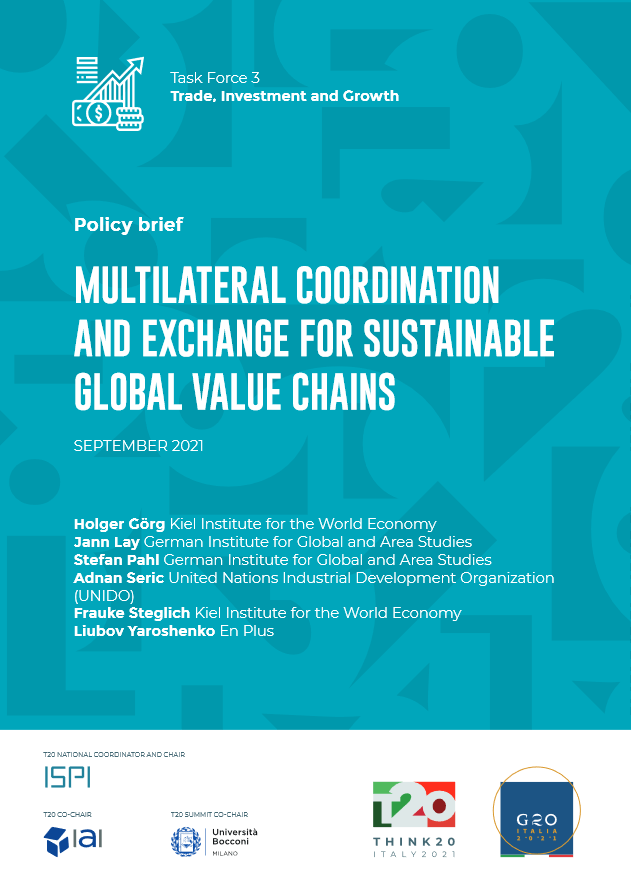
Jun 28, 2021
Sustainability and Mineral Supply Chains – Trends in the Mining Industry
In this podcast episode, we take a closer look at mineral supply chains. Mining often happens under poor working conditions, the transport of raw materials is energy intensive and the recycling of used minerals is often not profitable and may actually illude today's state of the art. In this podcast we want to ask: How can mineral supply chains become more sustainable? Are voluntary goals of ...

May 15, 2021
Myths of African food supply chains
In our third episode, we look at food supply chains in Africa. Food plays - like everywhere else on this planet - a big role on the African continent. Partly because it's still scarce in many places. Hunger is still the biggest health risk in Africa. But partly also because the middle class is growing rapidly and people are eating more and more diversified. Listen to moderator Nicolas Martin...

May 1, 2021
Joseph Sarkis
Mandating Sustainable Governance of the Supply Chain – Complementing Old Carrots with New Sticks?
In the wake of the COVID-19 crisis, supply chain challenges have received renewed attention and have become a major concern from both resilience (Golan et al., 2020) and sustainability (Sarkis, 2021) perspectives. For example – based on its Green Deal – the European Union (EU) is considering the circular economy as a tool for Post-COVID recovery, which in turn requires closed-loop supply chain...

Feb 11, 2021
The biggest risks for supply chains
In our first podcast episode we talked to Professor Gary Gereffi and Dr. Tilman Altenburg. Professor Gary Gereffi is the godfather of global value chains. In Durham, North Carolina he is an Emeritus Professor of Sociology and the Director of the Global Value Chains Center at Duke University. Tilman Altenburg is the head of the programme Transformation of Economic and Social Systems at the German D...

Jan 1, 2021
Julia Schwarzkopf, Klaus Fischer, Martin Müller
Success factors of voluntary sustainable supply chain management sector initiatives
Sustainability can create greater efficiency and cost savings in the supply chain. Supply chains, which are more complex and global than ever before, are full of both risks and opportunities. The risks range from inconsistent or poor quality to supply disruptions to health and safety concerns to corruption. Businesses face pressure to adopt sustainable supply chain practices from various stakehold...
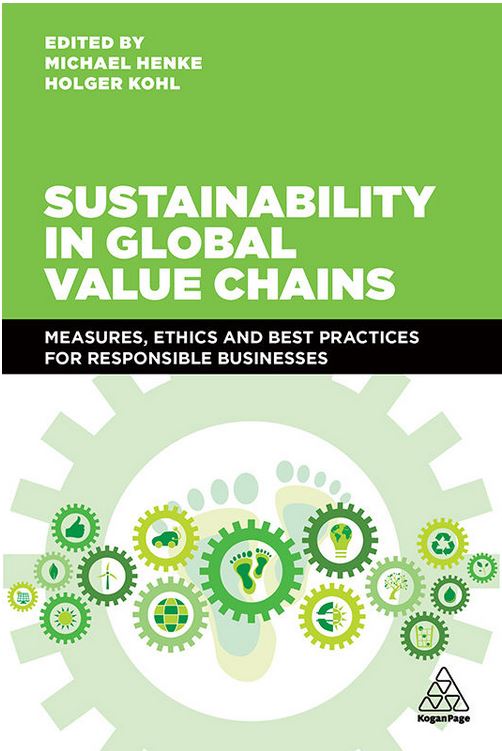
Jan 1, 2021
Almut Schilling-Vacaflor, Andrea Lenschow, Edward Challies, Benedetta Cotta, Jens Newig
Contextualizing certification and auditing: Soy certification and access of local communities to land and water in Brazil
The massive expansion of soy production in Brazil has contributed to a loss of access for local communities to land and water, particularly in highly dynamic frontier regions in the Cerrado. Soy certification standards like the Roundtable on Responsible Soy (RTRS) contain principles that are supposed to prevent such problems. In this paper, we examine the extent to which certification and auditing...
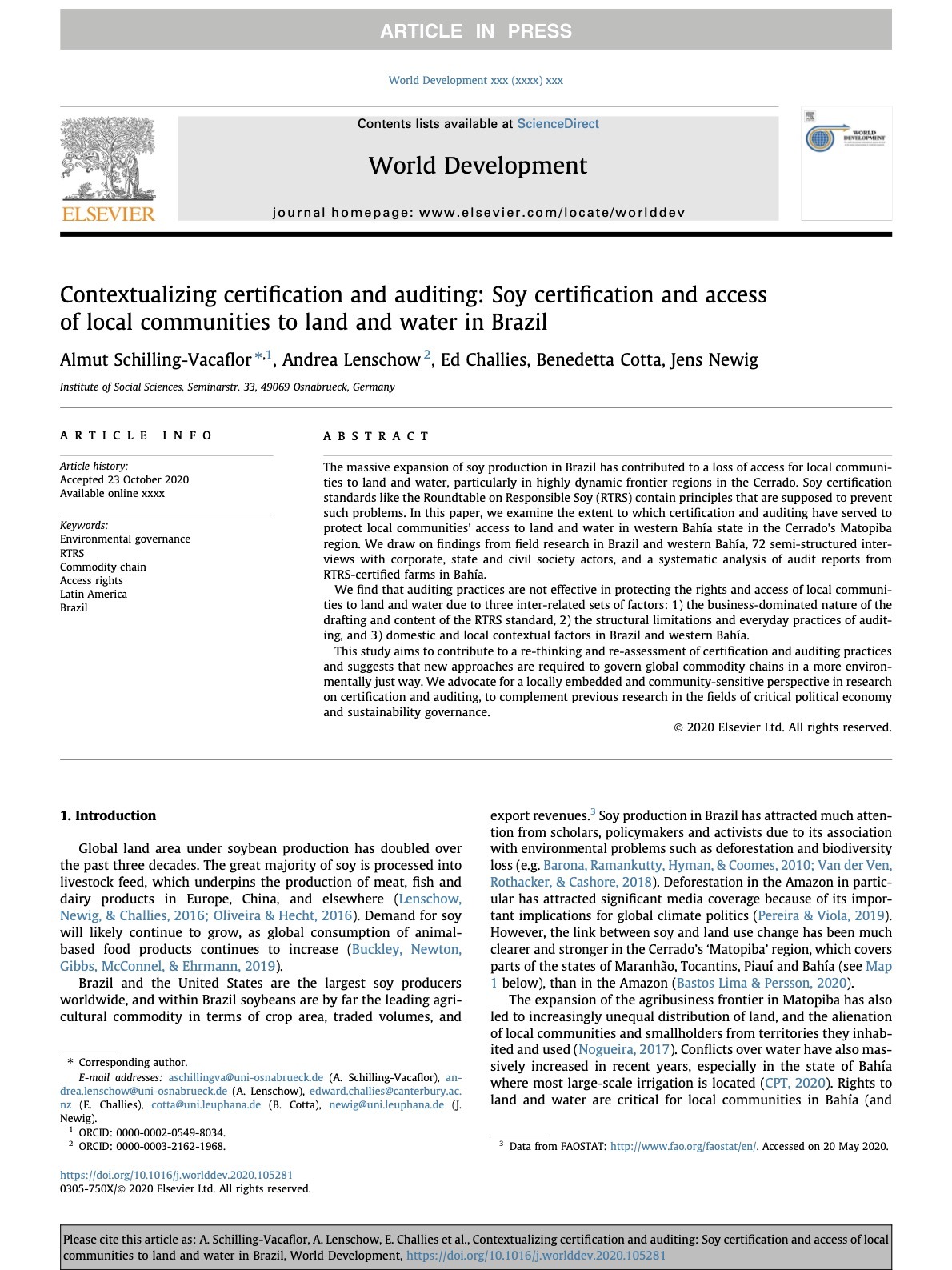
Jan 1, 2021
Günther Maihold.; Melanie Müller.; Christina Saulich.; Svenja Schöneich
Responsibility in Supply Chains – Germany’s Due Diligence Act Is a Good Start
On 3 March, the Federal Cabinet adopted an act on corporate due diligence in supply chains. This represents an important step towards German businesses assuming full and proper responsibility for the supply chains associated with their goods and services. The move puts Germany in a group of European countries like France and the Netherlands that have already instituted legal frameworks of their ow...
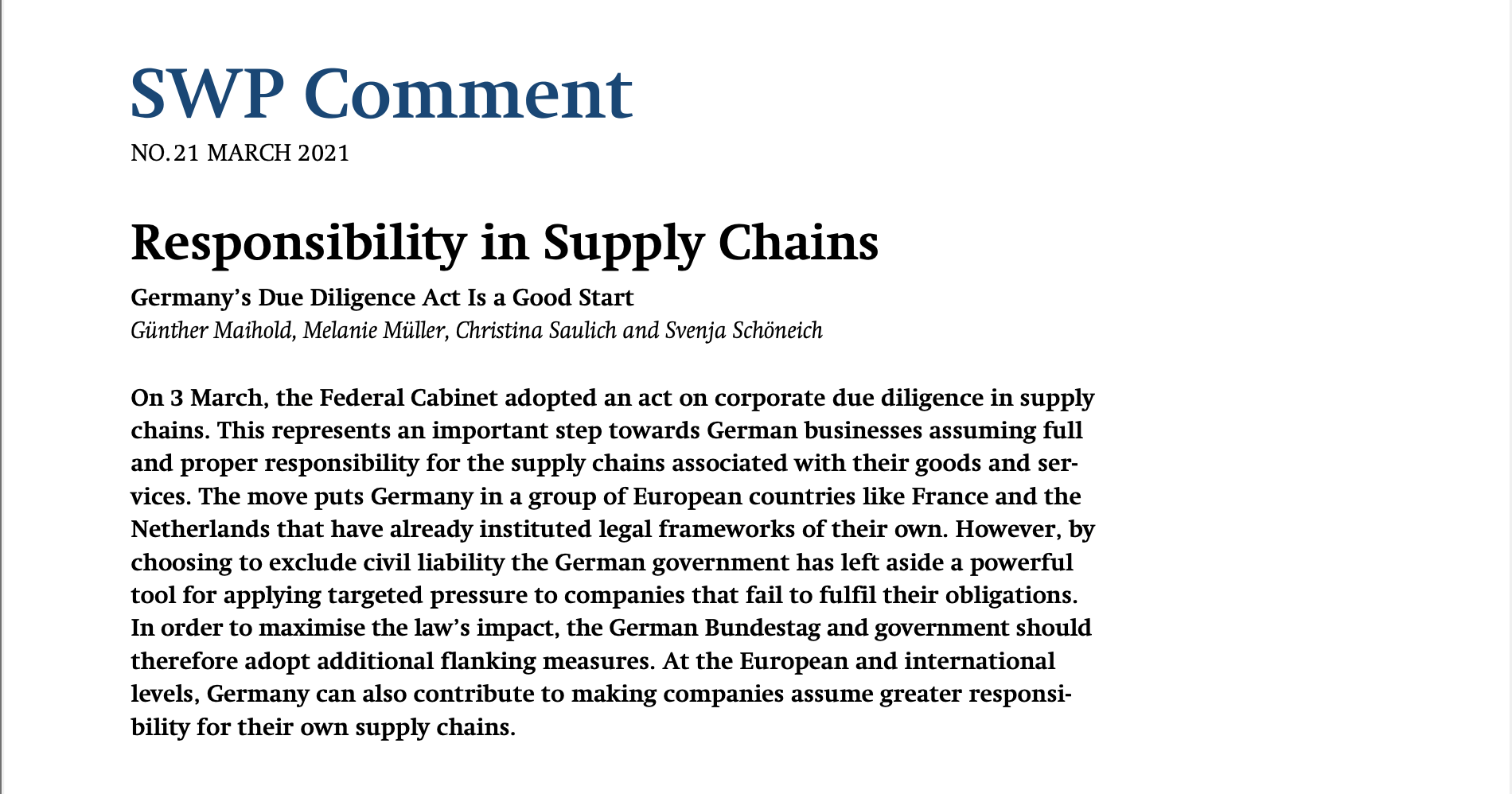
Dec 15, 2020
Adriana Erthal Abdenur
Protecting archaeological sites in the Amazon is essential for environmental wellbeing
Raging fires, expanding mineral extraction and land clearing for agribusiness are not only destroying Amazonian lands and biodiversity, they are also eradicating fundamental knowledge on land stewardship. Climate diplomacy has a key role to play in protecting archaeological sites that preserve lessons from the past that could help the Amazon recover in the future. The Brazilian Amazon is seeing...
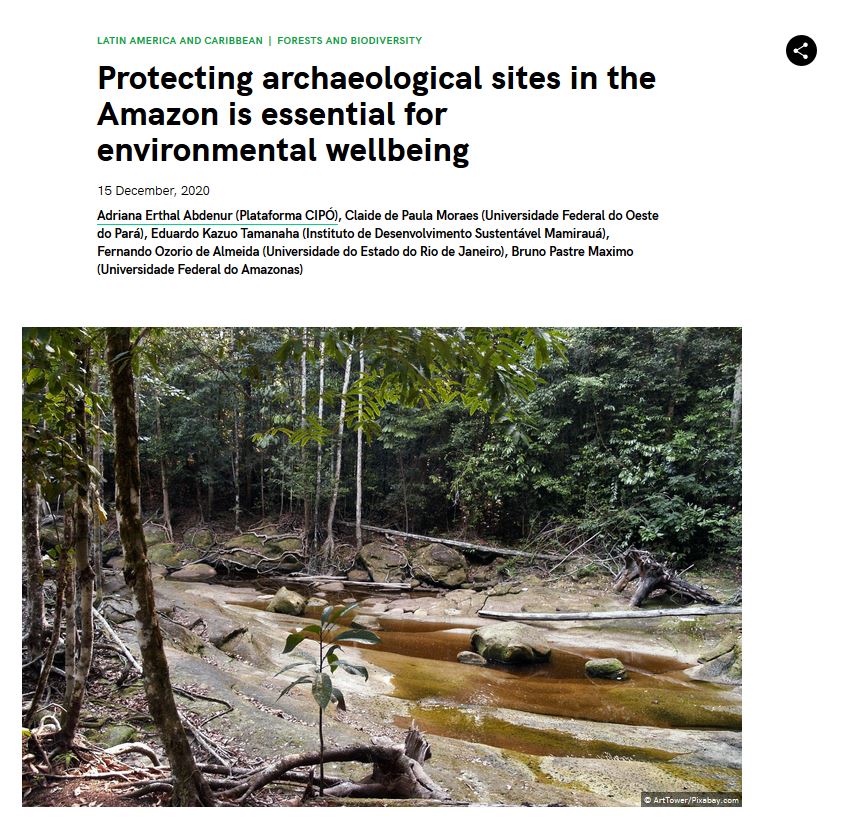
Nov 23, 2020
Adriana Erthal Abdenur
How Can Artificial Intelligence Help Curb Deforestation in the Amazon?
Deforestation has traditionally been viewed as an environmental issue, but, increasingly, illegal logging in rainforests is being understood as an issue of transnational organized crime. Forests cover 31 percent of the planet, are home to 80 percent of the world’s terrestrial species of animals and plants, and provide for the livelihoods of 1.6 billion people. Yet rising deforestation rates are ...
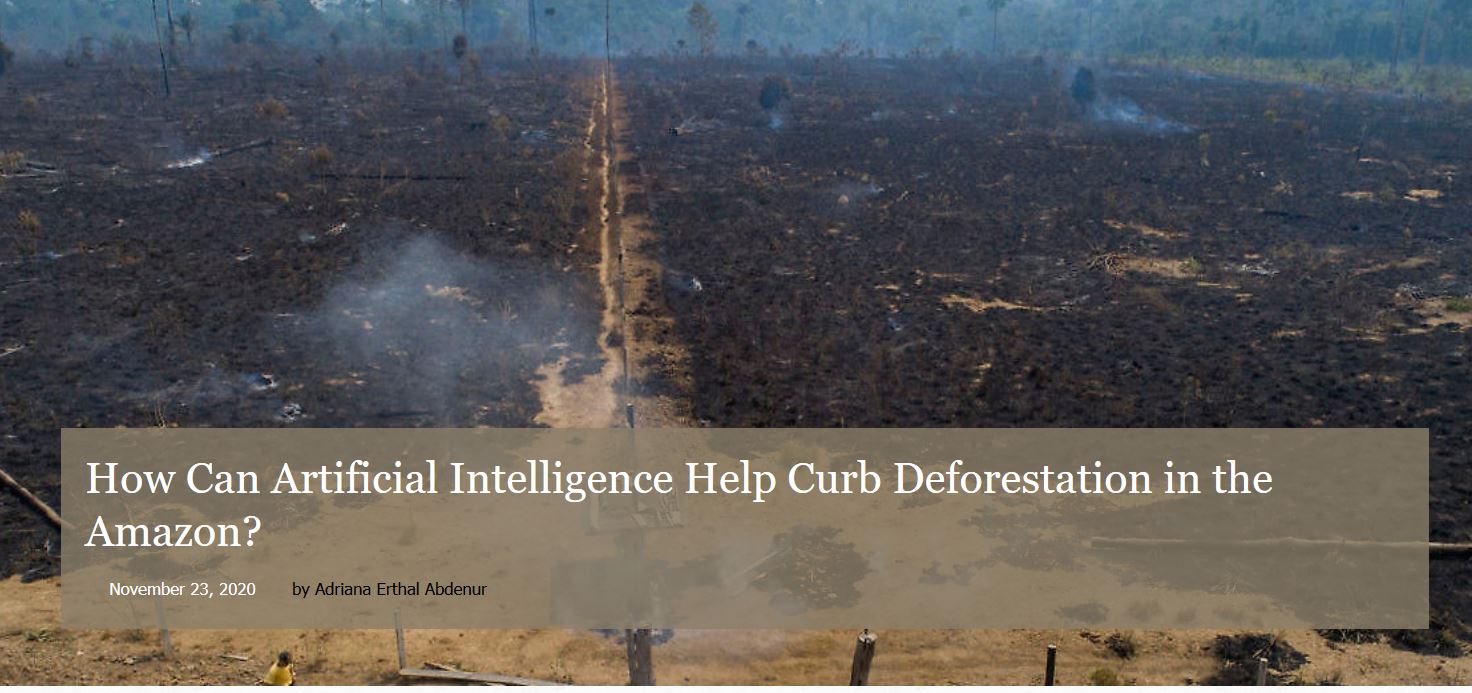
Jan 1, 2020
Maria-Therese Gustafsson; Roger Merino; Martin Scurrah
Domestication of International Norms for Sustainable Resource Governance: Elite Capture in Peru
In recent years, international actors have promoted international norms related to sustainable and inclusive resource governance. However, we know little about how such attempts are contested and adapted in domestic reform processes. Drawing on insights from norm diffusion and institutionalist theories, this article traces how first bilateral aid agencies and then OECD have influenced the institut...
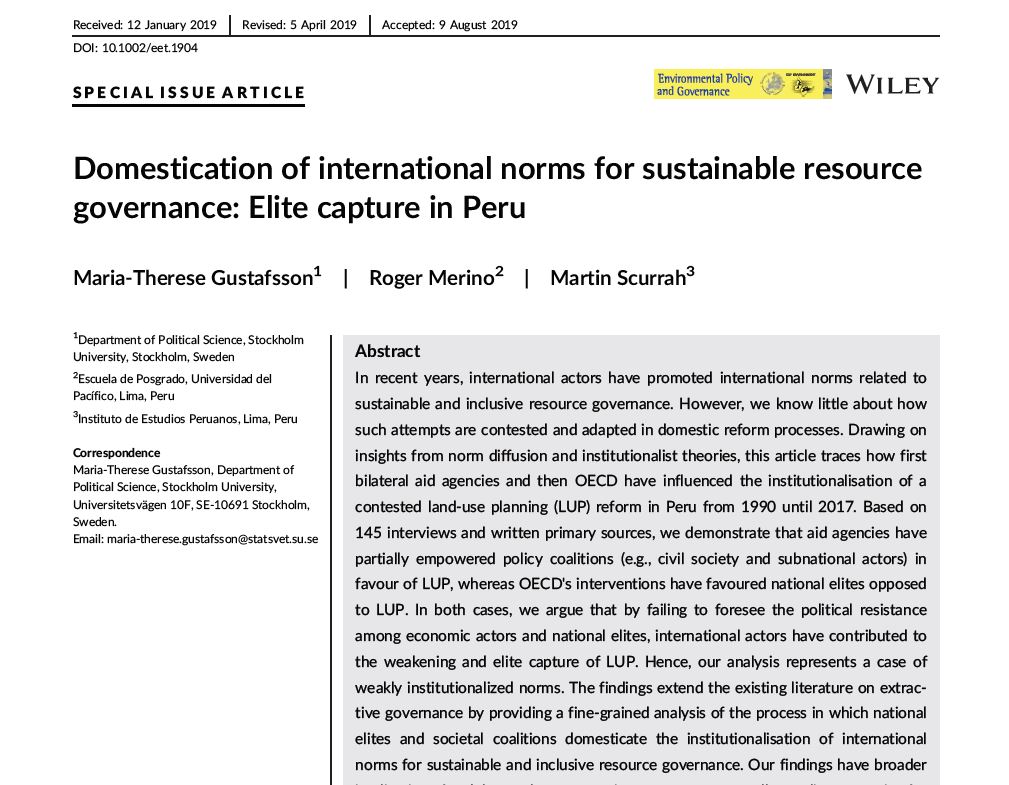
Jan 1, 2020
Bissinger, Katharina, Clara Brandi, Sandra Cabrera de Leicht, Matteo Fiorini, Schleifer Schleifer, Santiago Fernandez de Cordova, Niematallah Ahmed
Linking Voluntary Standards to Sustainable Development Goals
With the 2030 Agenda for Sustainable Development, the United Nations has called on the private sector to contribute more to achieving the sustainable Development Goals (SDGs). This report helps decision makers in the public and private sectors to understand where voluntary sustainability standards are best placed to contribute. It maps the linkages between these standards and each SDG goal, includ...
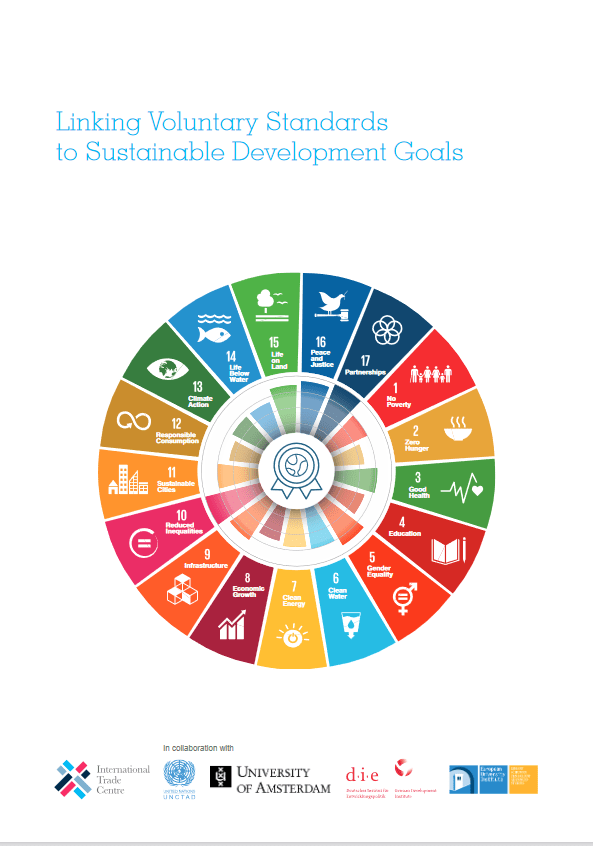
Jan 1, 2020
Bettina Rudloff, Christine Wieck
Sustainable Supply Chains in the Agricultural Sector: Adding Value Instead of Just Exporting Raw Materials
The corona pandemic has placed supply chains back on the agenda. The economic repercussions spotlight the complexity of today’s global division of labour. Current German and European initiatives are seeking to tighten the responsibility of final business consumers for human rights and sustainability in their supply chains. The objective is to enforce sustainable production in sovereign third cou...
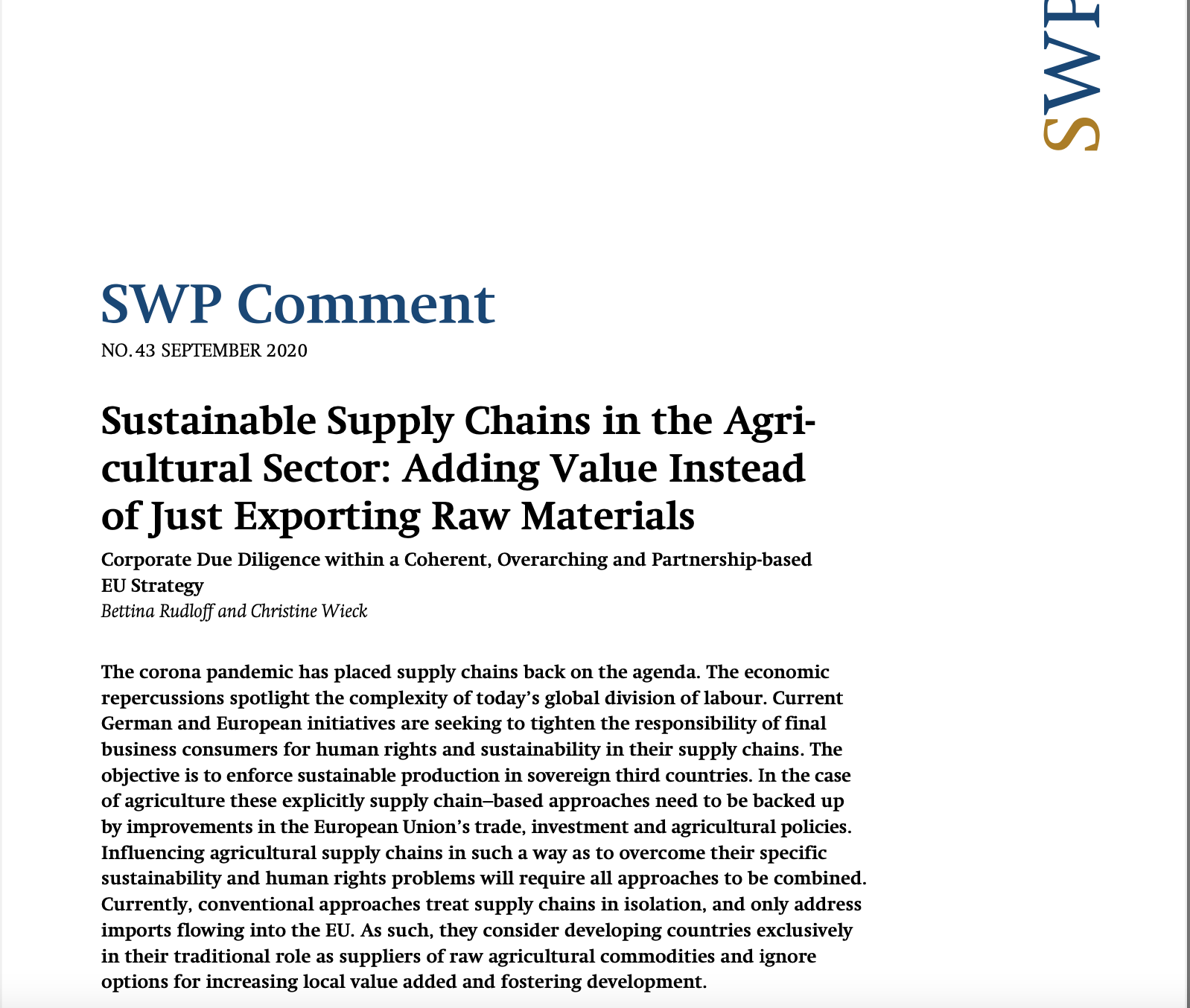
Jan 1, 2020
Bettina Rudloff
A Stable Countryside for a Stable Country? The Effects of a DCFTA with the EU on Tunisian Agriculture
Agriculture is central to the stability of Tunisia’s economy and society. The new Deep and Comprehensive Free Trade Agreement (DCFTA) under negotiation with the EU offers opportunities for the agricultural sector, but also presents risks for the country as a whole. Within Tunisia there is strong emotional resistance to the DCFTA. Its intensity is comparable to the strength of feeling against the...
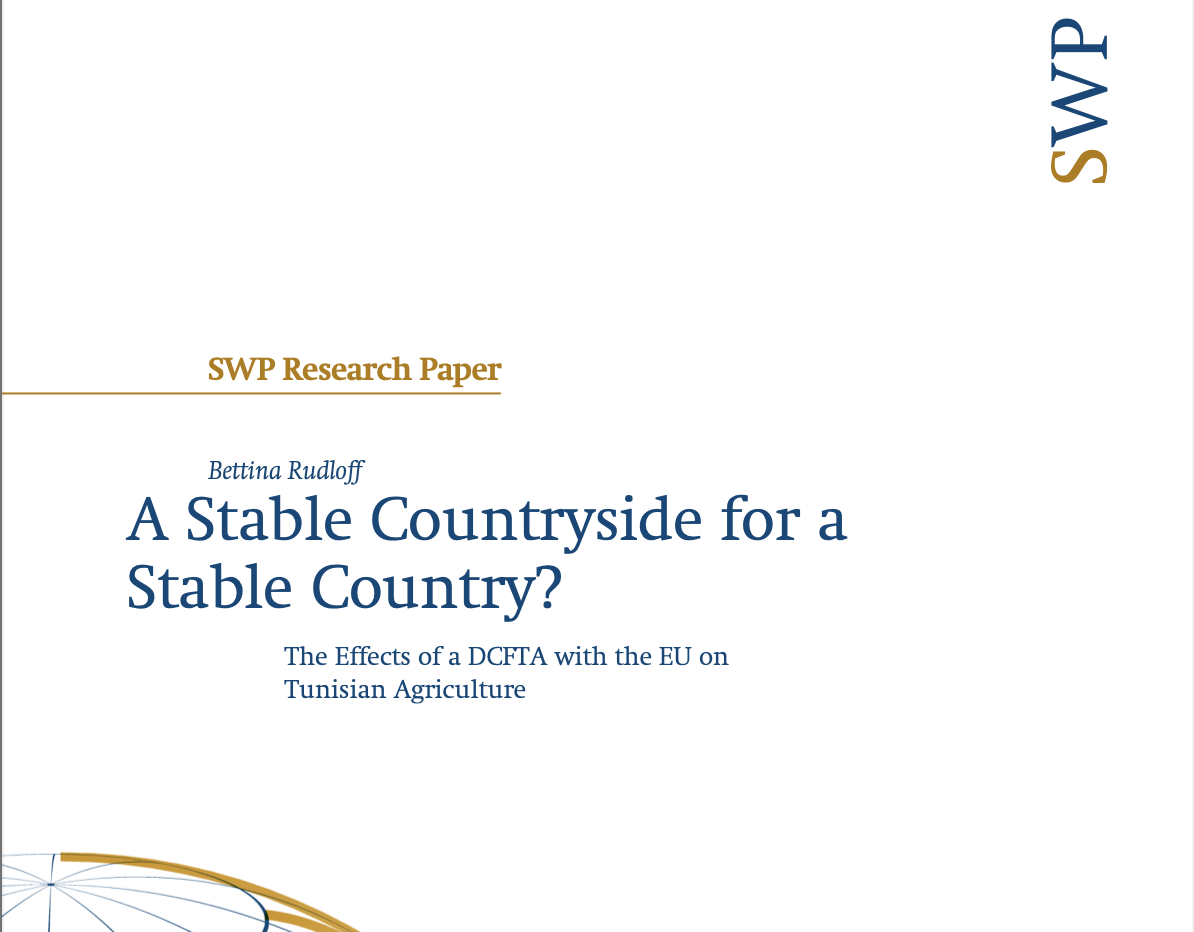
Jan 1, 2020
Iain J. Fraser, Martin Müller, Julia Schwarzkopf
Transparency for Multi-Tier Sustainable Supply Chain Management: A Case Study of a Multi-tier Transparency Approach for SSCM in the Automotive Industry
Sustainability in supply chain management (SSCM) has become established in both academia and increasingly in practice. As stakeholders continue to require focal companies (FCs) to take more responsibility for their entire supply chains (SCs), this has led to the development of multi-tier SSCM (MT-SSCM). Much extant research has focused on simple supply chains from certain industries. Recently, a c...

Jan 1, 2020
Melanie Müller
Versorgungssicherheit: Marktdynamiken und Machtverschiebungen einplanen
Die Covid-19-Pandemie und der von ihr verursachte Einbruch des globalen Handels haben in verschiedenen Weltregionen eine Debatte über Abhängigkeiten von globalen Lieferbeziehungen entfacht. Mittlerweile deuten sich geographische Machtverschiebungen in Lieferketten an. Noch ist ungewiss, wie sich diese Verschiebungen entwickeln werden, doch fest steht, dass politische Entscheidungsträger darauf ...
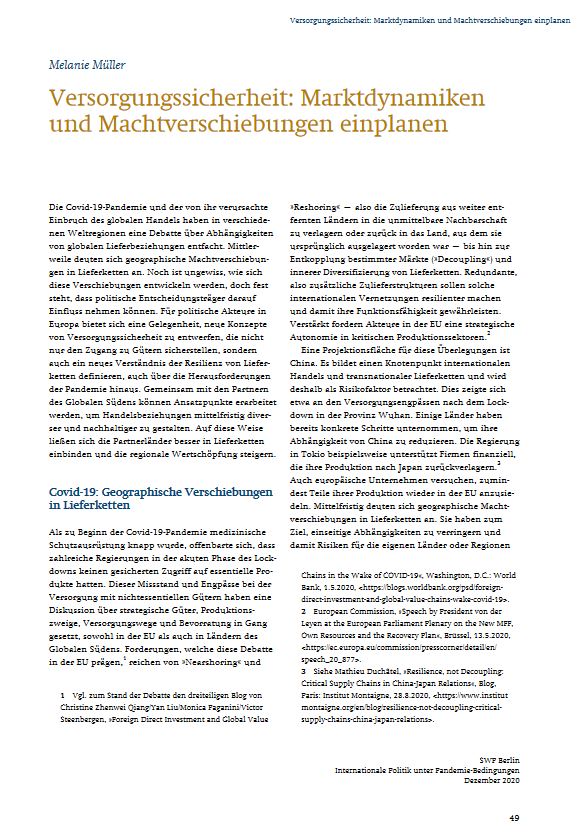
Jan 1, 2020
Anthony Goerzen, Simon Peter Iskander, Joerg Hofstetter
The effect of institutional pressures on business-led interventions to improve social compliance among emerging market suppliers in global value chains
Emerging market governments are incented to attract global value chain (GVC) activities to fuel economic growth. At the same time, in light of real and perceived workplace-related injustices within emerging markets, GVC lead firms are under pressure to improve social standard compliance within their upstream supply chain. Among the most common approaches to achieve these outcomes is to impose stan...
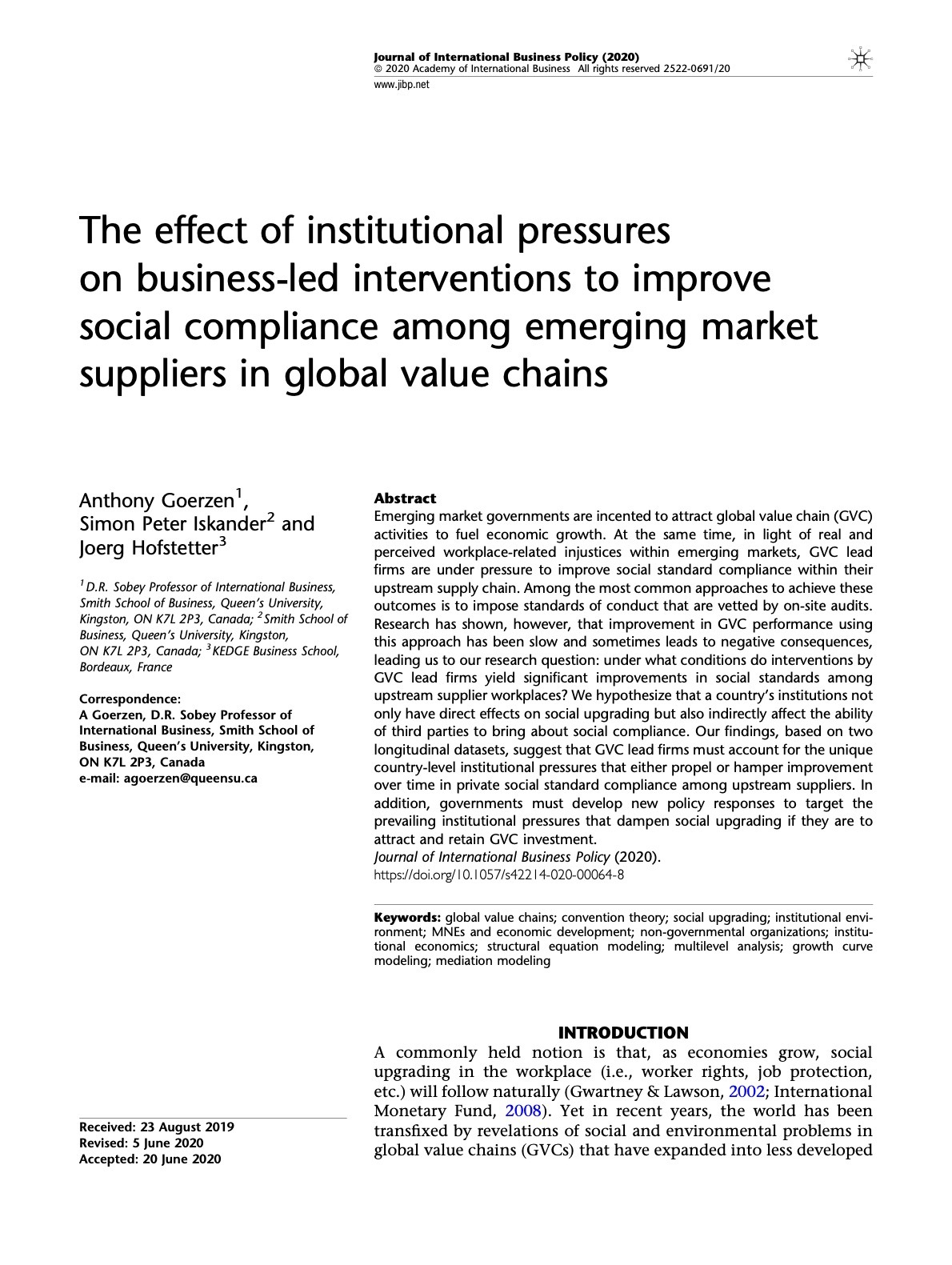
Jan 1, 2020
Iain J. Fraser, Julia Schwarzkopf, Martin Müller
Exploring Supplier Sustainability Audit Standards: Potential for and Barriers to Standardization
Global focal companies are increasingly required and expected to monitor the sustainability risks and activities in their supply chains, which has resulted in increasing supplier sustainability audit activity and growth in the number of sustainability initiatives/associations. While common, shared audit standards were originally conceived to reduce audit fatigue; with overlapping and converging su...
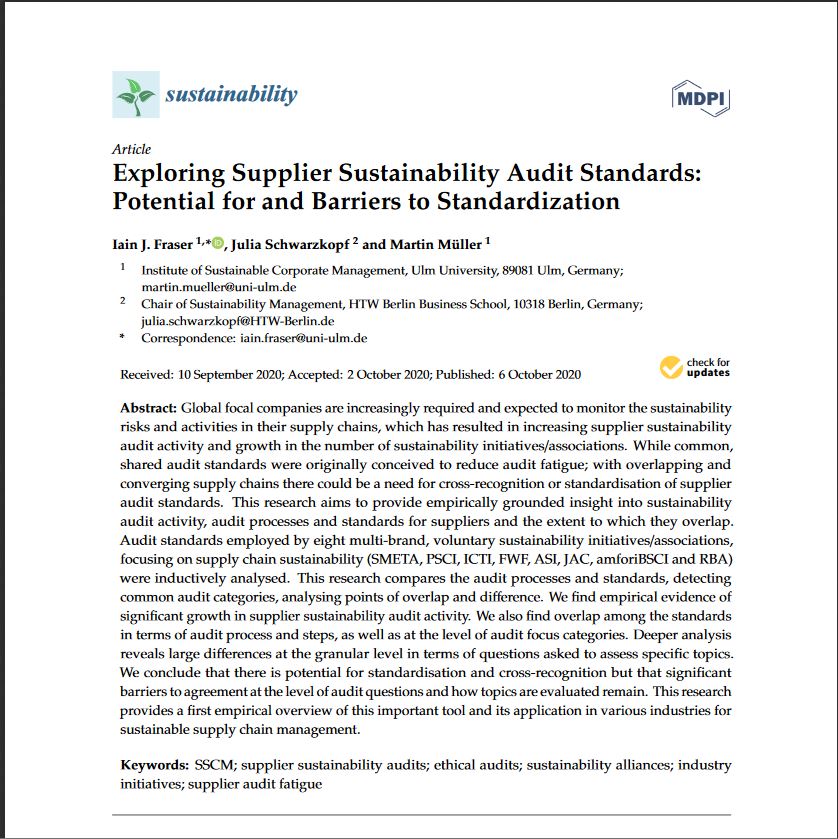
Jan 1, 2019
LONE RIISGAARD, PETER LUND‐THOMSEN, NEIL M. COE
Multistakeholder initiatives in global production networks: naturalizing specific understandings of sustainability through the Better Cotton Initiative
In recent years, various academics, consultants, companies and NGOs have advocated a move towards more cooperative approaches to private sustainability standards to address the widely identified shortcomings of the compliance paradigm. However, is it possible to address these limitations by moving towards stakeholder inclusion and capacity building while at the same time catering to the demands of...

Jan 1, 2019
Stephanie BARRIENTOS, Lara BIANCHI, Cindy BERMAN
Gender and governance of global value chains: Promoting the rights of women workers
Private governance channelled through social compliance programmes and gender initiatives of multinational companies have had limited impact in tackling gender discrimination in global value chains (GVCs). The United Nations Guiding Principles on Business and Human Rights (UNGPs) provide a public–private governance framework to address human rights globally, including gender equality. This artic...
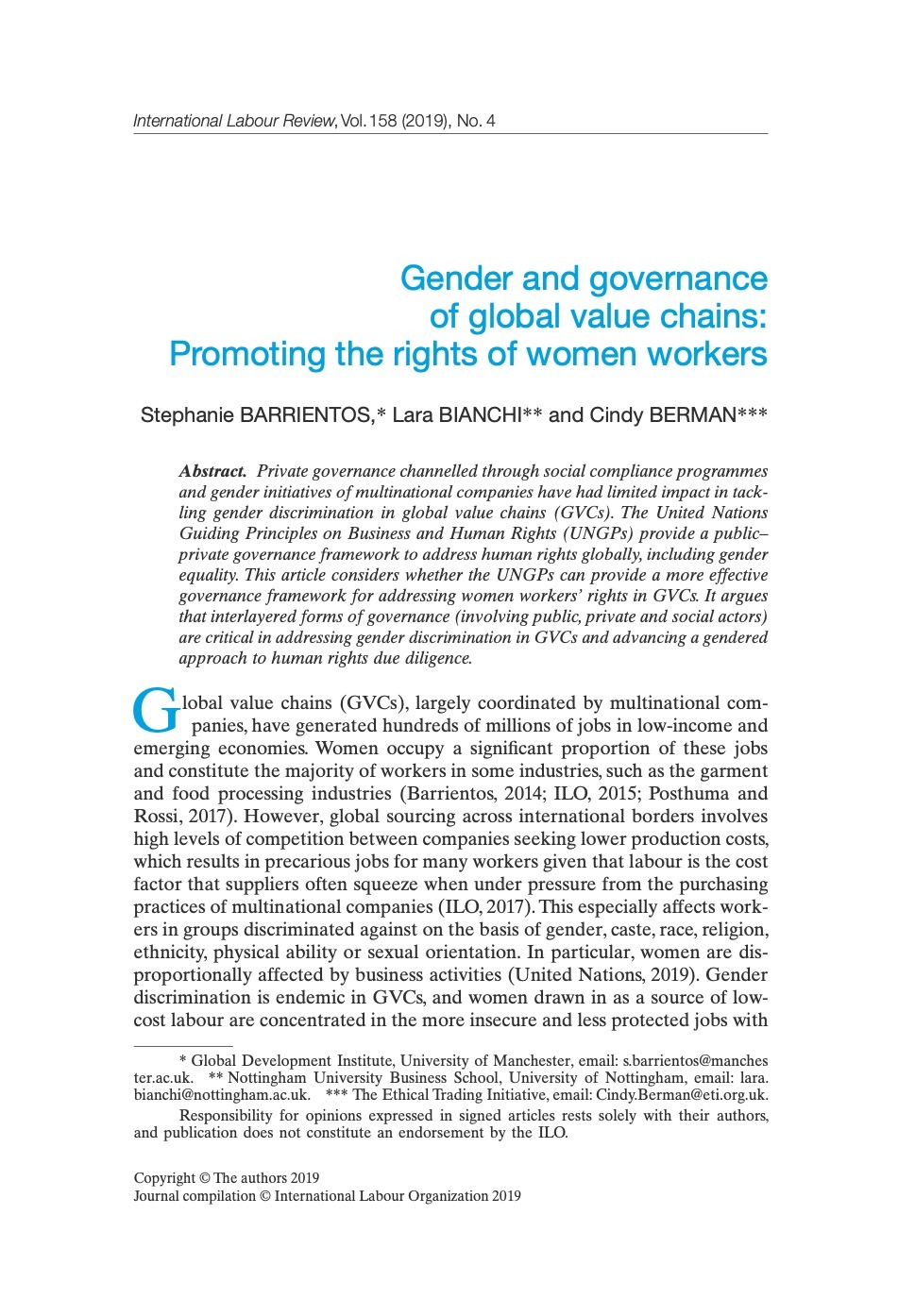
Jan 1, 2019
Matteo Fiorini, Bernard Hoekman, Marion Jansen, Philip Schleifer, Olga Solleder, Regina Taimasova, Joseph Wozniak
Institutional design of voluntary sustainability standards systems: Evidence from a new database
Voluntary sustainability standards (VSS) have become a significant element of the governance of international trade and production. Even though VSS are not mandatory (required by law), in practice they are often necessary for producers to participate in global value chains. Finally, VSS are often considered costly for producers. This article provides an overview of the global VSS landscape, and ad...
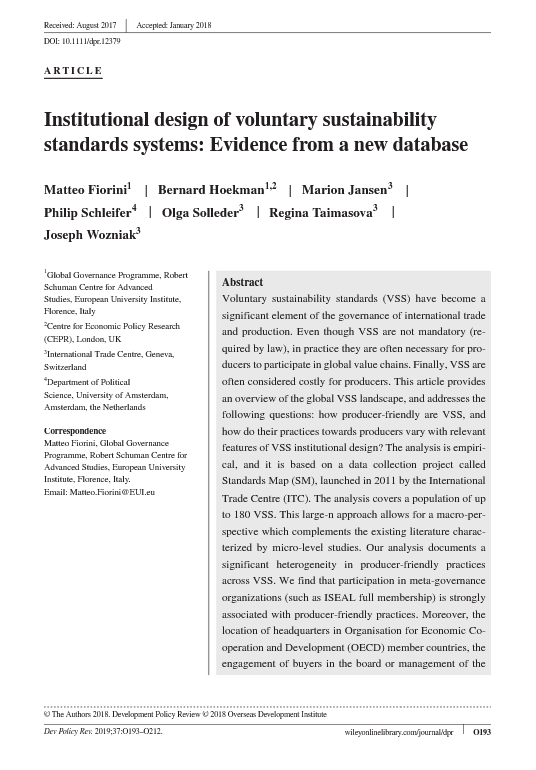
Jan 1, 2019
Matteo Fiorini, Bernard Hoekman, Marion Jansen, Philip Schleifer, Olga Solleder, Regina Taimasova, Joseph Wozniak
Institutional design of voluntary sustainability standards systems: Evidence from a new database
Voluntary sustainability standards (VSS) have become a significant element of the governance of international trade and production. Even though VSS are not mandatory (required by law), in practice they are often necessary for producers to participate in global value chains. Finally, VSS are often considered costly for producers. This article provides an overview of the global VSS landscape, and ad...
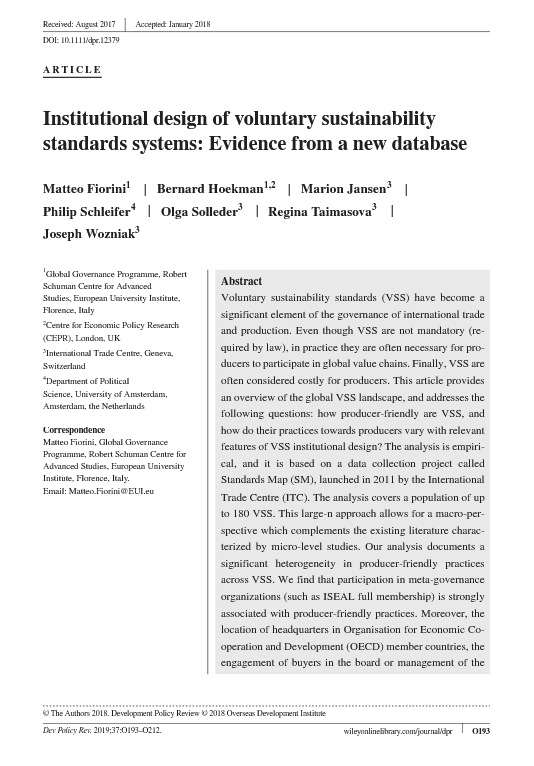
Jan 1, 2019
Joerg S. Hofstetter
Multi-tier sustainable supply chain management
A focal company’s boundary of accountability for social or environmental misconduct in its supply chain is hard to define. Non-sustainable business practices can occur at all stages in the supply chain: at raw material exploitation, intermediate production, or transportation. And it can occur atany tier of supplier. Thus investigating multi-tier supply chain sustainability is critical. This chap...
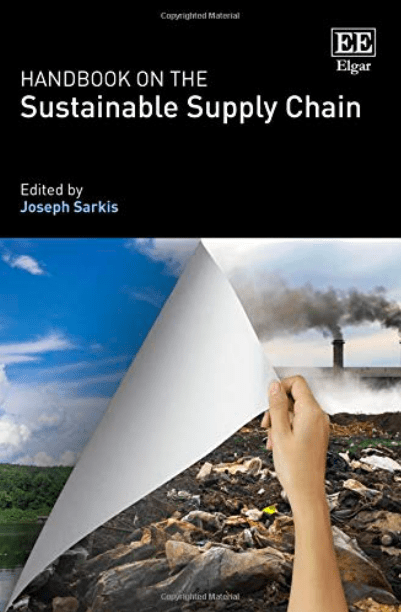
Jan 1, 2019
Stefano Ponte
Green Capital Accumulation: Business and Sustainability Management in a World of Global Value Chains
Tackling climate change and other environmental crises entails a critical reflection on processes and outcomes that are behind sustainability management by business. Sustainability has become a commodity itself, to be traded, bought, sold and managed like all others. How lead firms in global value chains (GVCs) address sustainability issues has become a key competitive element and a source of valu...
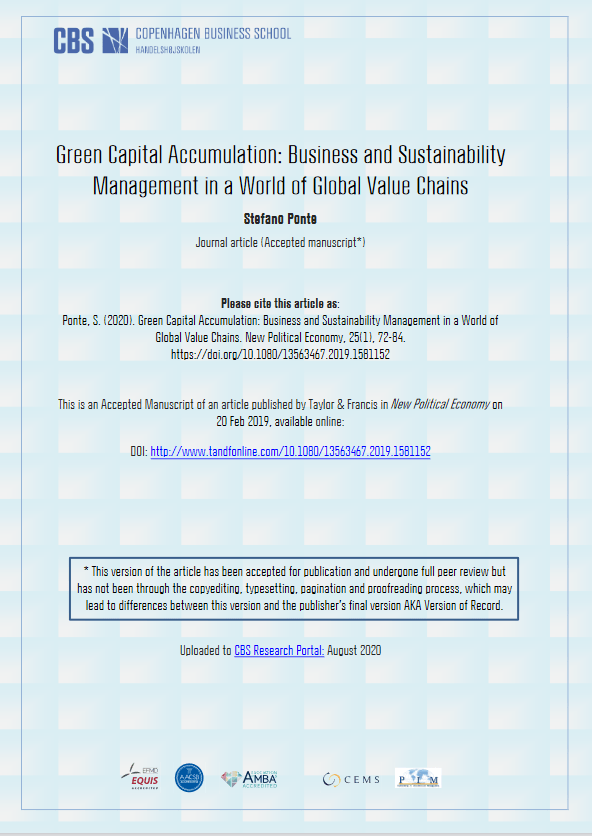
Jan 1, 2019
Mahwish J Khan, Stefano Ponte, Peter Lund-Thomsen
The ‘factory manager dilemma’: Purchasing practices and environmental upgrading in apparel global value chains
Economic and environmental upgrading in global value chains are intertwined processes. The existing global value chain literature has so far articulated the relationships between economic and social upgrading but has only recently started to explore the challenges of environmental upgrading from the perspective of suppliers in the Global South. In this article, we examine the ‘factory manager di...
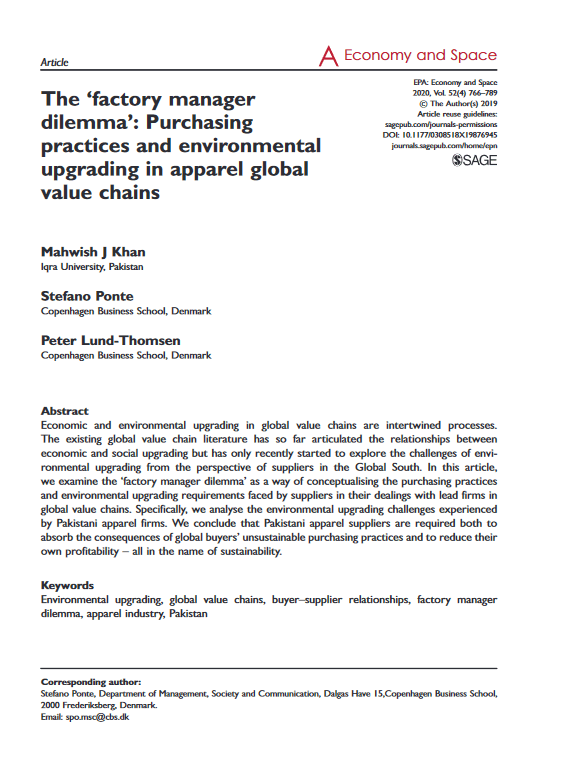
Jan 1, 2018
Jörg H. Grimm, Joerg S. Hofstetter, Joseph Sarkis
Interrelationships amongst factors for sub-supplier corporate sustainability standards compliance: An exploratory field study
Sub-supplier compliance with a focal firm's corporate sustainability standards (CSS) is increasingly recognized as an important dimension of sustainable supply chain management. This paper draws on recent sub-supplier management studies and their critical success factors (CSFs) to investigate the interrelationships between and strengths of CSFs. While previous research focused on the perspect...

Jan 1, 2018
Markus Krajewski
State duty to protect and corporate responsibility for human rights in global supply chains
The responsibility of transnational corporations for human rights violations in global supply chains continue to be of public interest: Fires in textile factories in Pakistan, environmental destructions due to oil production or worst forms of child labour in mines which produce minerals for electronic goods are just a few examples. Even if companies are not formally bound to internationally bindin...
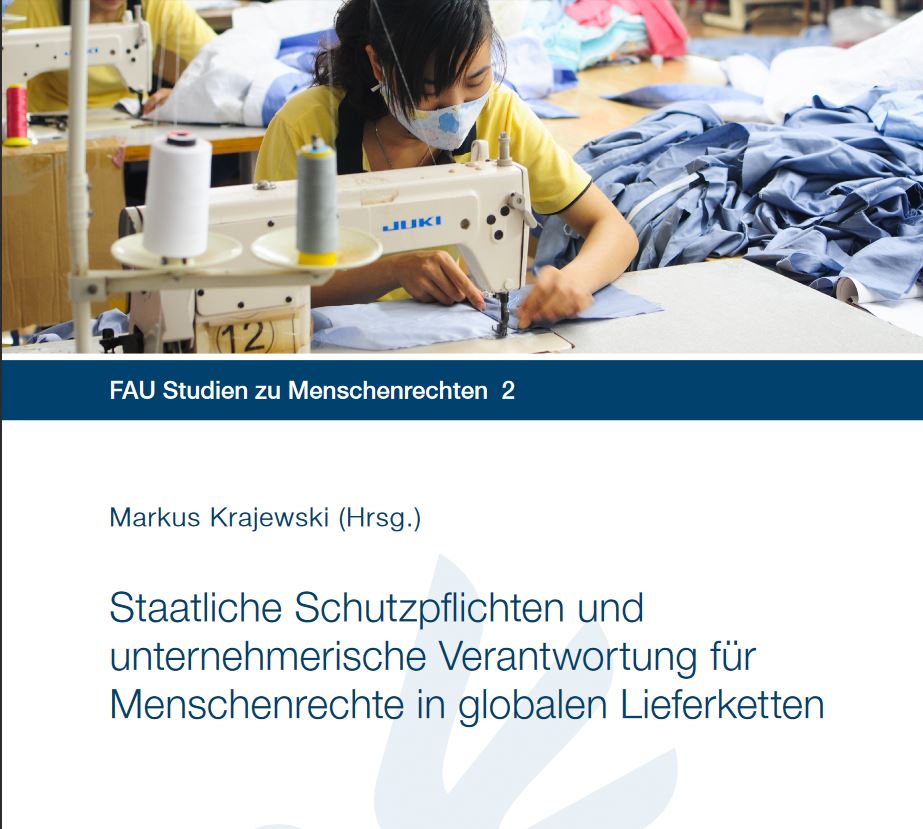
Jan 1, 2018
Raphael Kaplinsky, Mike Morris
Standards, regulation and sustainable development in a global value chain driven world
Regulations and standards have become an increasingly important factor affecting the capacity of producers to participate in global markets. Directly and indirectly, they not only determine the terms of market-entry but also affect the extent to which different producers are able to position themselves in global value chains in a manner which provides for socially and environmentally sustainable i...
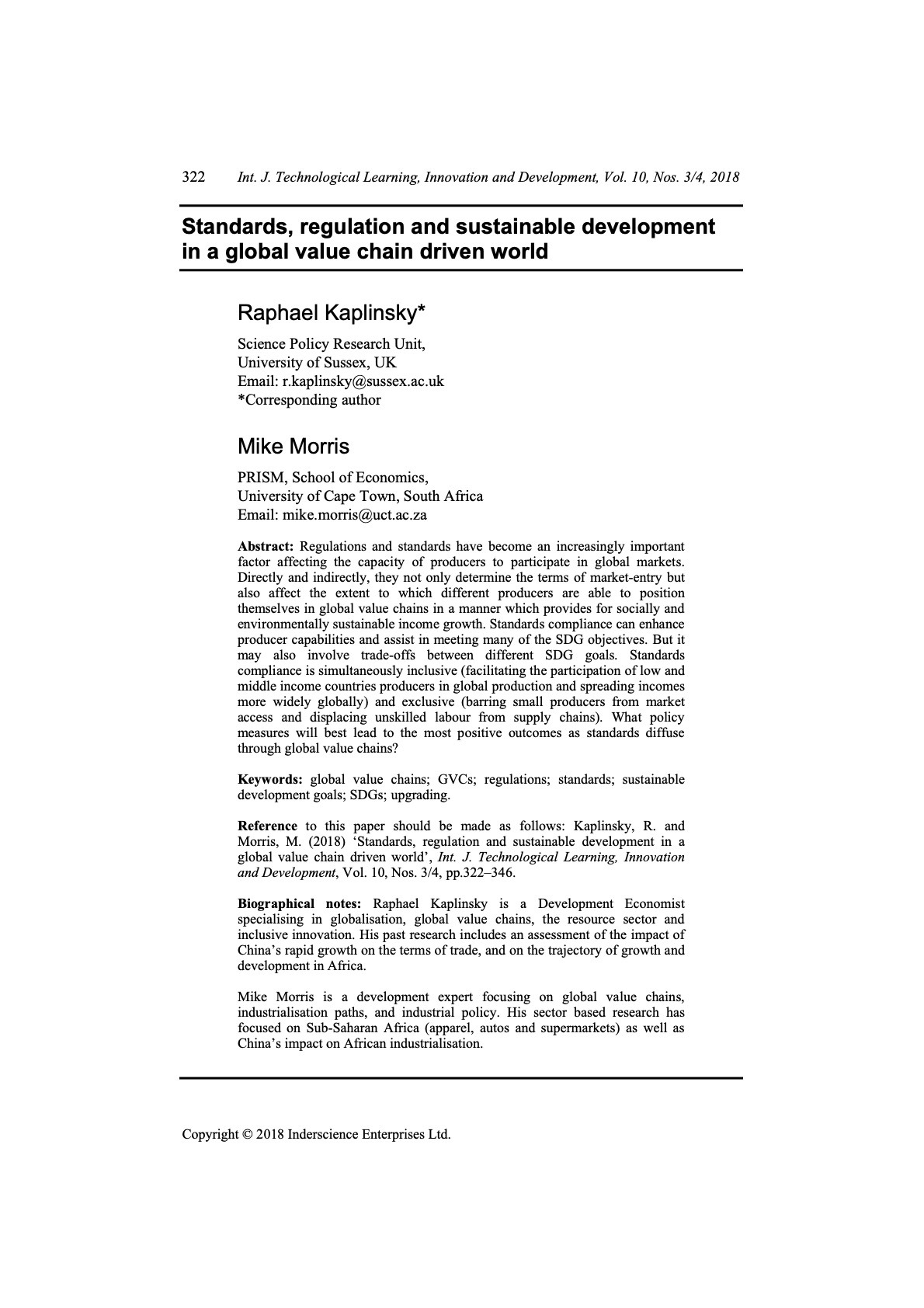
Jan 1, 2017
Matteo Fiorini, Bernard Hoekman, Marion Jansen Philip Schleifer, Olga Solleder, Regina Taimasova and Joseph Wozniak
Suppliers’ access to voluntary sustainability standards
Voluntary Sustainability Standards (VSS) have long become a usual attribute of international production and trade. Despite the fact that VSS are not legally binding, in order to be a part of global value chains, they have become de facto mandatory, and non-compliance may lead to exclusion of producers from the value chains. The relevance of VSS is reflected by a growing literature across social sc...
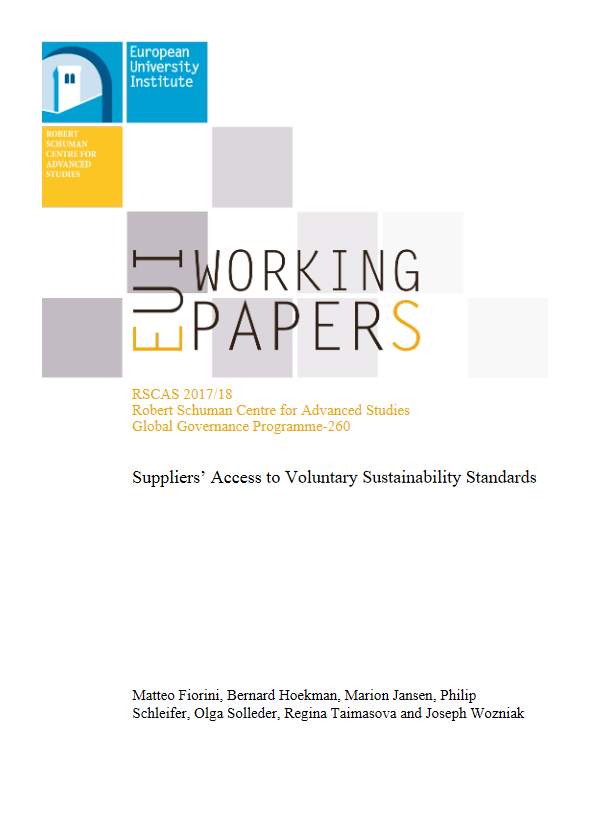
Jan 1, 2016
Fiorini Matteo, Schleifer Philip, Sollerder Olga, Tainasova Regina, Jansen Marion, Wozniak Joseph, Hoekman Bernard
Social and environmental standards: Contributing to more sustainable value chains

Jan 1, 2014
Daniele Giovannucci, Oliver von Hagen, Joseph Wozniak
Corporate Social Responsibility and the Role of Voluntary Sustainability Standards
Corporate Social Responsibility (CSR) is becoming a standard feature particularly for large and consumer-oriented firms. What started in the late 1960s as something closer to charity or philanthropy has evolved dramatically in recent years. Yet, as actualization of the CSR concept is increasingly explored and becoming better-defined, there is limited understanding of how to operationalize CSR and ...


